








PROPERTY MANAGEMENT


LOGISTICS AND WAREHOUSING

TAX LAW









OFFSHORE INVESTMENTS


INTEGRATED MEDICAL SOLUTIONS THE HOTEL BOOM











MIXED-USE PRECINCTS
The appeal of smart, sustainable city lifestyles











WWW.BUSINESSMEDIAMAGS.CO.ZA APRIL 2024
WATCH On Park, live smart On Park
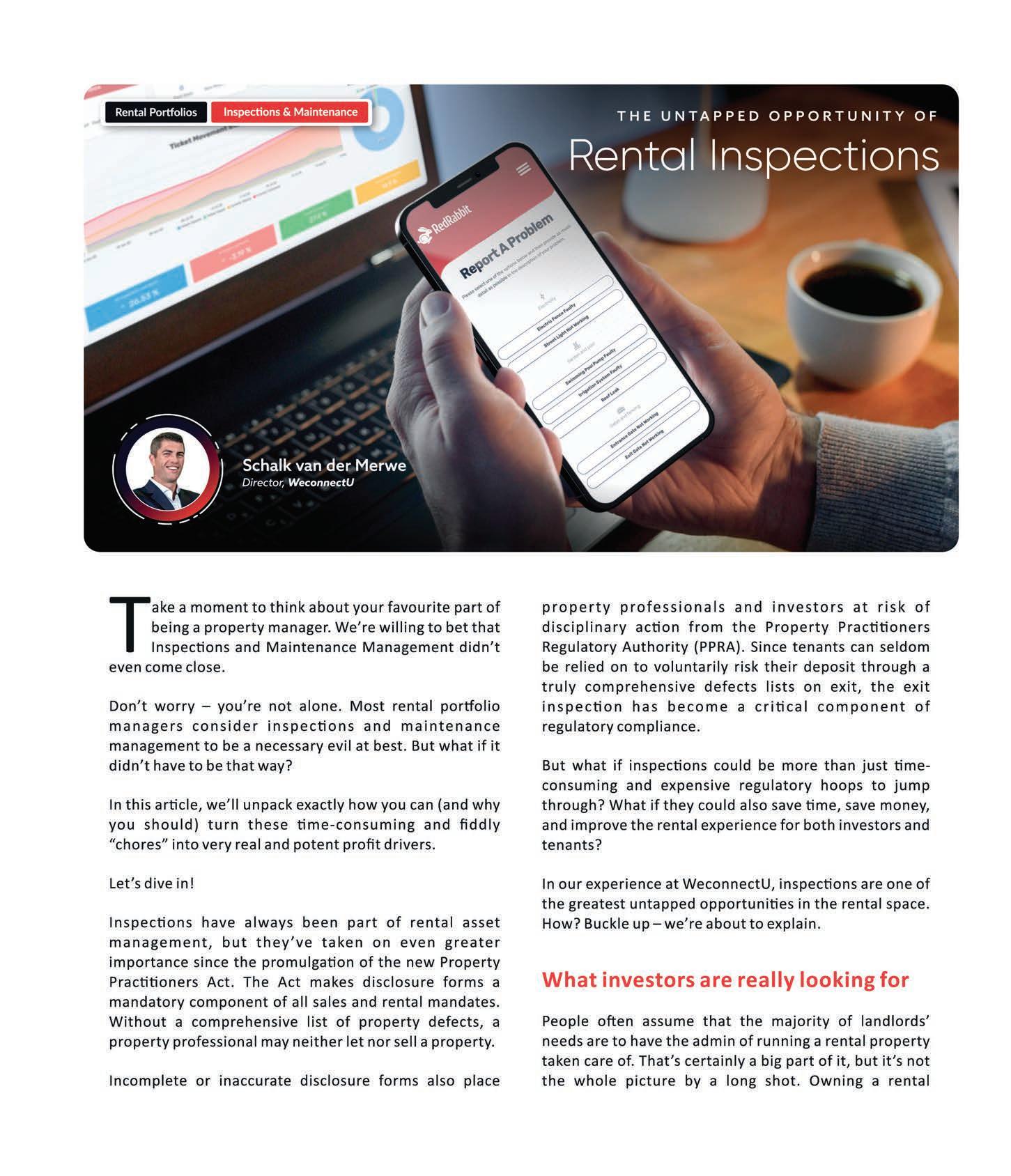

Contents
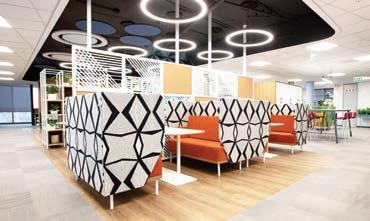
6 PROPERTY MANAGEMENT
Trends anticipated to continue shaping office and workspace design; Innovations and technology forecasts within the sector; and Professional upskilling courses worth the investment.
10 FINANCE AND INVESTMENT
The experts share tips on investing in commercial property; Why the Western Cape’s coastal towns are yielding good results for investors; 2024 top five market trends for investment professionals to note; tips on understanding tax law within the commercial property sector; and Offshore real estate investment gems.
22 INDUSTRIAL DEVELOPMENTS
How the logistics and warehousing boom is shaping the industrial development sector.
27 MIXED-USE DEVELOPMENTS
A greater focus on health, wellness and sustainability is contributing to the boom in living and working in walkable, bikeable communities.
28 RETAIL AND HOSPITALITY
Shopping malls are adapting their offerings to become thriving community and lifestyle centres; and a look at South Africa’s blossoming hotel industry and its contribution to the country’s economy.
PUBLISHED BY
Picasso Headline, A proud division of Arena Holdings (Pty) Ltd, Hill on Empire, 16 Empire Road (cnr Hillside Road), Parktown, Johannesburg, 2193 PO Box 12500, Mill Street, Cape Town, 8010 www.businessmediamags.co.za
EDITORIAL
Content Manager: Raina Julies rainaj@picasso.co.za
Contributors: Alisdair Crofton, Trevor Crighton, Stacey-Lee Kruger, Itumeleng Mogaki, Busani Moyo, Thando Pato, Johann van der Merwe
Copy Editor: Brenda Bryden
Content Co-ordinator: Natasha Maneveldt
Digital Editor: Stacey Visser vissers@businessmediamags.co.za
DESIGN
Head of Design: Jayne Macé-Ferguson
Senior Design: Mfundo Archie Ndzo
Advert Designer: Bulelwa Sotashe
Cover Image: Courtesy Rabie
SALES

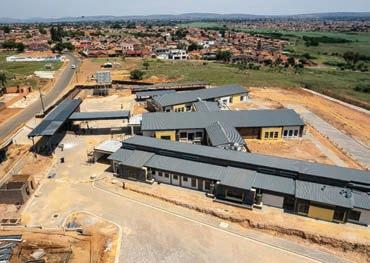
31 RESIDENTIAL
Project Manager: Merryl Klein merrylk@picasso.co.za | +27 21 469 2446
PRODUCTION
Production Editor: Shamiela Brenner
Advertising Co-ordinator: Fatima Drama
Subscriptions and Distribution: Fatima Dramat fatimad@picasso.co.za
Printer: CTP Printers, Cape Town
MANAGEMENT
Management Accountant: Deidre Musha
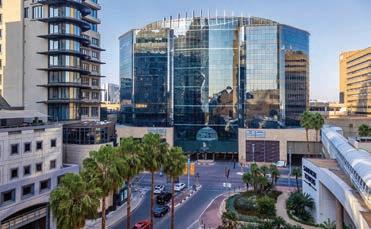
We discover where the greatest value and growth in South African property can be found, and the influencing trends; and Why Dubai and the United Kingdom are the top picks of South Africans looking to purchase homes overseas.
35 MEDICAL DEVELOPMENTS
We unpack the reasons for the growth in this sector and what development and investment opportunities exist.
36 STUDENT HOUSING

A look at the trends within the student accommodation sector.
Business Manager: Lodewyk van der Walt
General Manager, Magazines: Jocelyne Bayer


COPYRIGHT: Picasso Headline. No portion of this magazine may be reproduced in any form without written consent of the publisher. The publisher is not responsible for unsolicited material. Property is published by Picasso Headline. The opinions expressed are not necessarily those of Picasso Headline. All advertisements/advertorials have been paid for and therefore do not carry any endorsement by the publisher.

6 35 10

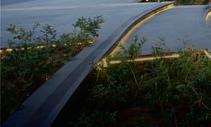
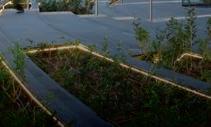
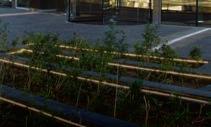


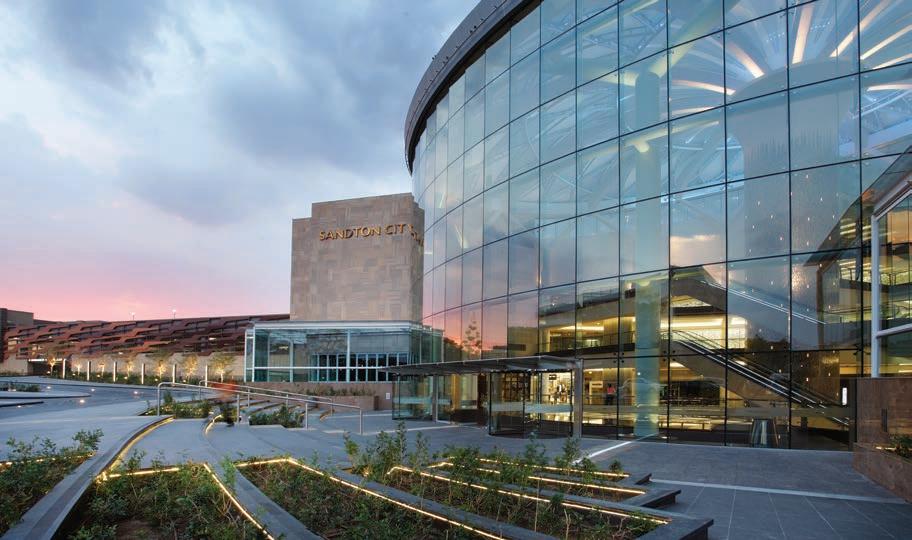
SEVEN DECADES OF ORIGINAL, FUNCTIONAL AND CREATIVE ARCHITECTURE
MDS ARCHITECTURE is one of the oldest established architectural firms in South Africa and celebrates its 70 th anniversary in 2024
MDS Architecture’s partners unpack the practice’s 70-year journey in the context of a changing world from the early days, to the interesting mix of elegance, emerging freedom of thought and Space Age influence of the swinging 1960s. South Africa’s skylines and the country’s love affair with shopping centres marked the 1970s and 1980s, while the 1990s heralded the country’s first democratic elections.
Partner Pierre Lahaye refl ects on how the approach to buildings has changed over the years. “Gone are the days when unfriendly structures were erected on the outskirts of town. Developments are now viewed as part
of the fabric of each community. As such, they are treated as public buildings that create new nodes and places of gathering. Communities value developments as important job creators both during construction and as trading entities. In fact, we have seen communities voluntarily step in to protect buildings under threat,” he says.
THE EARLY YEARS
In 1954, Gluckman and De Beer founded an architectural practice based in Johannesburg’s city centre. It would grow to become known as MDS Architecture and boast a legacy spanning decades. Throughout the 1950s and
“ARCHITECTURE MUST CONSISTENTLY OFFER MORE INNOVATION AND INTERACTION. PEOPLE WANT TO BE ENGAGED, AND BUILDINGS NEED TO SERVE AS ELEGANT, AESTHETIC VESSELS TO SHOWCASE WHAT IS ON OFFER TO THE PUBLIC.” – AKI SAVVA
1960s, the practice helped to shape the urban landscape, focusing primarily on office buildings in Johannesburg.
The 1960s saw the firm’s portfolio expand with a burgeoning list of projects, including mosques in Mayfair and Lenasia. The multilevel high-rise Bank of Lisbon office building, completed in 1967, along with other office buildings, reflected the modernist and brutalist architectural influence of the time. With each project, the practice earned a reputation for innovation and excellence.
REGIONAL SHOPPING CENTRES TAKE OFF IN SOUTH AFRICA
The opening of the Bryanston Shopping Centre in 1971 marked MDS Architecture’s journey into shopping centre design. A string of iconic shopping centres ensued during the 1970s and 1980s, including Rosebank Mall, Eastgate, Westgate, Highgate and the eminent Sandton City, which emerged as a symbol of progress and a catalyst for the development of Sandton as the wealthiest square mile in Africa.
In the midst of hardship in South Africa, themed buildings provided an escape with a mix of style influences during the 1970s and 1980s.
Interestingly, there has been a gradual change in the footprints of regional and super-regional shopping centres. The early ‘80s and ‘90s designs were substantial in size and have since evolved into more compact centres ranging between 40 000 and 60 000m2 in line with changes in big-box major tenants, cinema reductions and economic contexts.
NEW HORIZONS
South Africa transitioned into democracy in 1994, and MDS Architecture embraced new horizons. Continuing the tradition of operating from buildings designed by the firm, the team moved into its new single-level home at 4 Stan Road, Sandton.
The 1990s witnessed the business’ expansion onto the global stage, with projects extending
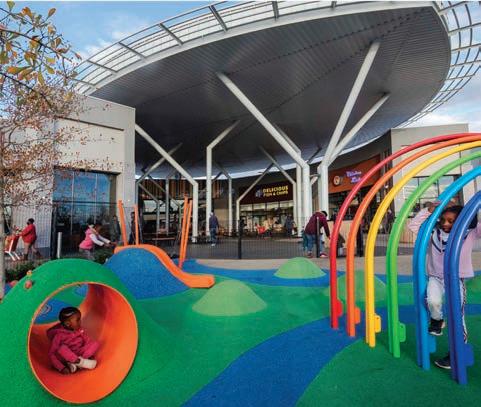
4 PROPERTY ADVERTORIAL MDS ARCHITECTURE
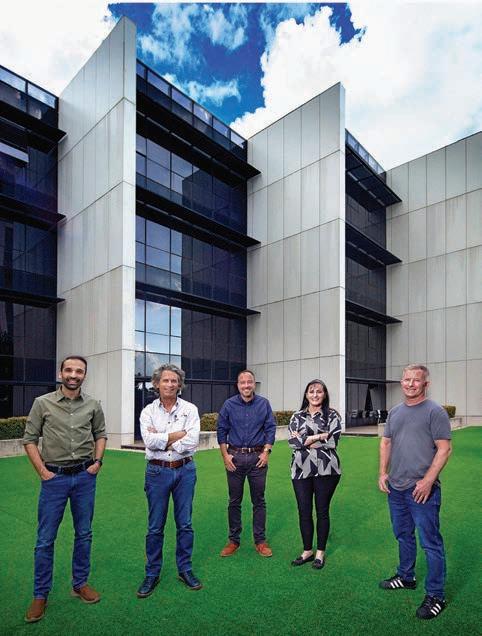
from South Africa to Dubai, East and West Africa and Mauritius. From hotels to leisure complexes, MDS Architecture left an indelible mark on the built environment at home and abroad.
Donald McGillivray, partner, comments: “In the thirty-four years since joining MDS Architecture, the practice has deepened its expertise to include casinos, hotels, leisure resorts and apartments to add to its capabilities in shopping centres and office buildings. Design has become increasingly collaborative and functional to ensure that buildings are also commercially astute. Contemporary, viable design ensures that the two key ingredients of architecture, functionality and creativity co-exist comfortably.”
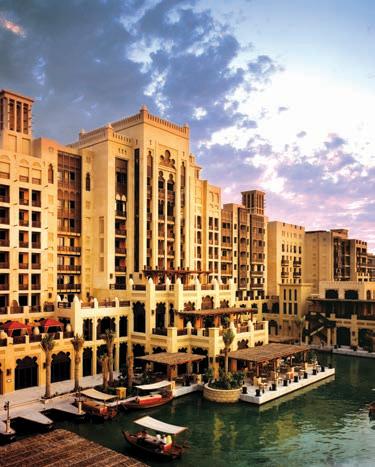
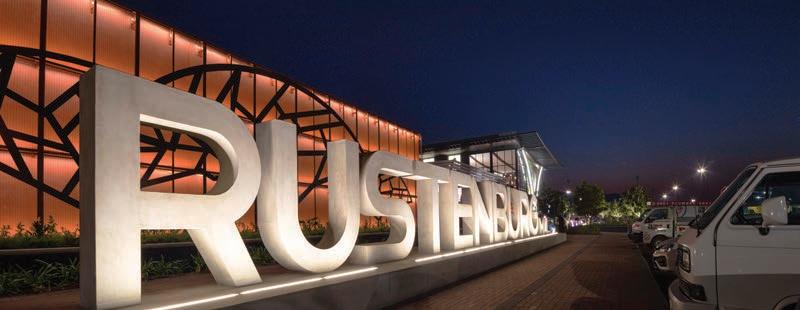
A NEW MILLENNIUM AND DIVERSITY
With the dawn of the new millennium came a renewed focus on sustainability. MDS Architecture led the charge by viewing green building initiatives and environmental consciousness as a prerequisite of best practice design. Technology advancements were quickly incorporated and more mixed-use developments were added to the fi rm’s growing capabilities.
As South Africa celebrated its rich tapestry of diversity during the 2010s, the work of MDS Architecture celebrated cultural heritage and inclusive design in diverse projects, such as Alex Mall, Ballito Junction and Mall of the North. Refurbishments gave new energy to Ferndale on Republic, Rosebank Mall and Sandton City’s iconic Diamond Walk, food court and cinema level.
Partner Louis Pretorius celebrates the state of development in South Africa’s more outlying areas. “Previously neglected areas are now enjoying top-tier contemporary design and finishes thanks to the pioneering vision of several developers who recognised the importance of serving disenfranchised communities. They realised (and persuaded financiers) that while migrant workers flocked to urban areas, those remaining in rural areas needed to be served properly,” he says.
MULTI-AWARD-WINNING DESIGNS AND NEW SURROUNDINGS
Year after year, commercial and retail industry bodies have recognised design excellence and commercial considerations. MDS Architecture has amassed over 80 South African and international awards over the past four decades.
In 2016, 4 Stan Road was redeveloped and MDS Architecture began a new chapter in this sculptural eight-storey boutique office development that received a 4-Star Green Star Design and Build rating from the Green Building Council.
“Architecture must consistently offer more innovation and interaction. People want to be engaged, and buildings need to serve as elegant, aesthetic vessels to showcase what is on offer to the public. We focus on delivering contemporary buildings with the ability to evolve,” says partner Aki Savva.
HALLMARKS OF REMARKABLE LONGEVITY
A common thread throughout MDS Architecture’s success is the accurate interpretation of client requirements with creativity, originality and exemplary deliverables. This has led to enduring relationships with developers and financial institutions. A source of great pride for the practice is that MDS Architecture has been the only architect of record for Sandton City since its launch over 50 years ago.
Partner Tia Kanakakis reflects on the uncompromisingly high standards that have arisen as a consequence of African architecture’s focus. “The beauty of African architecture is that it responds contextually to its environment, culture and demographic needs. Our retail developments are designed by South Africans and can stand shoulder-to-shoulder with the most outstanding international retail centres. MDS Architecture has set leading benchmarks for iconic commercial and retail architecture in our country,” she says.
Despite its size and the ease with which it executes large-scale projects, the culture and ethos at MDS Architecture are synonymous with those of a family practice.
The personal touch is a key ingredient of the secret recipe that explains how a 70-year-old practice with a rich history has an exciting future.



PROPERTY 5 Images: Supplied MDSARCHITECTURE For more information: +27 11 884 7999 info@mdsarch.co.za www.mdsarch.co.za Scan to go to the MDS Architecture website
MDS
ADVERTORIAL
ARCHITECTURE
Partners outside the home of MDS Architecture at 4 Stan Road, Sandton.
OFFICE DESIGN TRENDS
As the global workforce continues to navigate the evolving landscape of work, STACEY-LEE KRUGER, head of design at Trend Group, sheds light on ve trends anticipated to continue shaping of ce and workspace design in 2024
1. Combining home and office Working from home gave workers much more choice in how they used their environment. This is having a profound impact on how companies perceive their workspaces.
2. The new premium workspace Workspaces can go beyond comfort and even be luxurious. This points to how office design is evolving to create individualised, aesthetically pleasing spaces as often found at home or even in hotels.
3. Sustainability and biophilic design Sustainability allows companies to reduce their environmental footprint and enrich
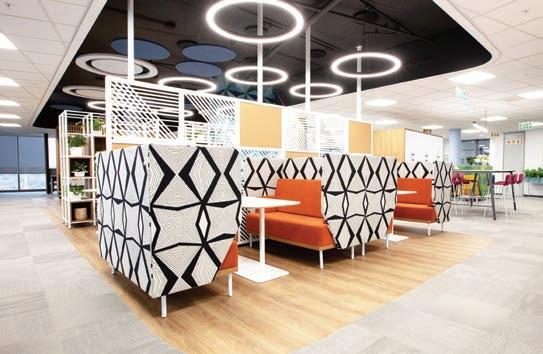
their corporate culture in terms of ESG (environmental, social and governance) goals.
4. Flexible, modular workstations Workstations are increasingly modular so they can be reconfigured to cater for all types of teams. It is an effective means for enhancing collaboration and using existing space much more efficiently.
5. Say goodbye to the monotonous office Bold colours and patterns counter the impression of a traditional, staid office space. Eye-catching patterns and lively hues inject energy and personality into the workspace.
THE CRITICAL ROLE OF TECHNOLOGY IN 2024
JOHANN VAN DER MERWE, MD of WeConnectU, shares that by embracing technology, leveraging big data and using arti cial intelligence to assist with daily tasks, property managers have the opportunity to communicate their value better
Over the past few years, it’s become clear that rental investors’ and homeowners’ needs and expectations have evolved.
Most are no longer satisfied with simple rental and community management administration services.
WeConnectU shares stats from more than 1 600 businesses, managing more than 800 000 assets/properties, on the difference technology has made to their businesses.

Instead, they’re seeking property managers who can deliver the same level of professionalism, attention to detail and visible value as the managers of their other asset classes.
In this area, technology has become a critical enabler, giving rental property managers the intelligent functionality they need to excel on the administrative front while also delivering a mind-blowing client experience that highlights their professionalism and value as rental asset managers.
Our 2023 survey revealed that the vast majority of rental managers embracing technology have experienced tangible benefits as a result. The question this year is how many more will join their ranks as rental asset managers of the future, and how many will be left in those asset managers’ dust?
COURSES FOR PROFESSIONALS
For those looking to up their game in property management, undertaking the following courses will give you the edge.



Supplied
Images:
6 PROPERTY Images: Supplied PROP MANAGEMENT
WAT CH MOR E INFO RE
AD
UCT Property Management: Marketing,
and Administration Prop Academy Commercial Property and Commercial Sales and Leases courses MOR E INFO UJ Property Management Programme
Contracts
10 tips to crafting your compact living space
Our living spaces are more than just a collection of square metres; they’re an expression of an individual’s identity, culture, personality and style. There’s nothing small about the choices we make in how we organise the place we call home — no matter the size, writes
JACQUES VAN EMBDEN, CEO of Blok
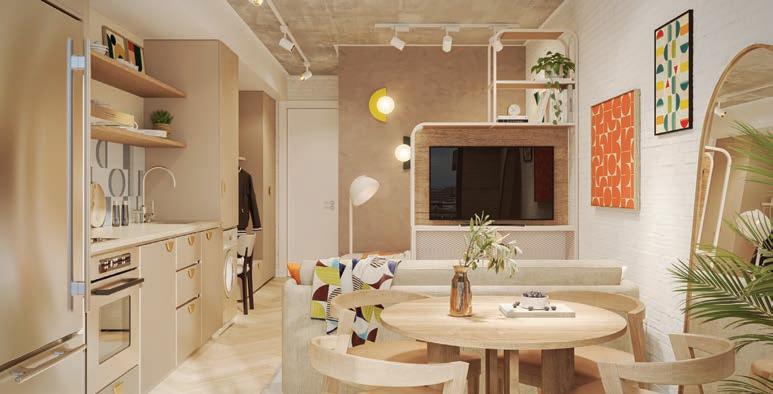
Blok developments in Sea Point offer added amenities, such as a laundry, communal gym, co-working spaces, meeting rooms and a deli serving delicious delights to digital nomads and locals alike.
Here are 10 ways you can make your compact living space unique, just like you.
1. ENTRANCE WAY. You don’t need a formal entrance hall to make a statement to anyone entering your micro or studio apartment. All you need is a statement accessory, such as an artwork, a plant or even a hat and coat stand. It’s that simple.
2. DOUBLE DUTY. Dual-function furniture is a Blok favourite. Furniture that folds out and up and doubles as shelving, seating or storage is perfect for rooms with limited floor space.
3. FLOOR SPACE. Open as much floor space as you can, even (and this may sound odd) by choosing furniture with legs. Another solid piece of advice is to let your furniture “float” by not pushing all of it flat against the walls.
4. COLOUR CO-ORDINATE. Catch the right colour effect by keeping colours cohesive, from wall colour to accessories and furniture. Choose just two or three colours for your home palette. Colour plays a big part in the energy of a room, so pick the ambience you want to come home to after a busy day – and bring that to life.
5. GO “GALLERY”. Be bold and make one feature wall a “Gallery Wall”. This could be just one large piece of art or a collection of images that make up a larger collage of pictures.
6. SCREEN IT. TVs can swallow up space in even the biggest room. There’s a solution for compact rooms here: go for a wall-mounted TV and conceal it with a fold-across artwork screen so it doesn’t appear to be an eyesore black hole in the wall.
7. REFLECTIVE GENIUS. Mirrors really do open up a closed space. But before you go out and buy a room full of reflection, decide on one or two clever walls and angles from where a mirror will do its best work by adding the illusion of more living room.
8. TRIM DOWN. In a home of any size, clutter and overcollection of things just makes for a mess. Keep spaces calm and centred, and let your favourite essentials in your living space breathe. The best home-making suggestion is always “a place for everything and everything in its place”.
9. TIDY UP. Tidy surfaces and floors. This cannot be overemphasised as it creates organised and collected home spaces. Don’t be tempted to keep collecting new goods. Instead, for every new candle you add to the coffee table take one item away.
10.
LIGHT FIX. In our compact living spaces, light is an all-important provider of good energy. One practical piece of advice here is to make sure you have at least three working lights in a room, and if your micro or studio apartment has good window space, consider adding to this flow of natural light with blinds, shutters or light voile curtains to ensure you literally let the light in.
Remember, it’s your living space. Only you call it home – make it your very own space of joy.





PROPERTY 7 ADVERTORIAL BLOK Images: Supplied
ENQUIRE TODAY For more information: +27 66 186 1658 sales@blok.co.za www.blok.co.za Scan to visit the Blok website

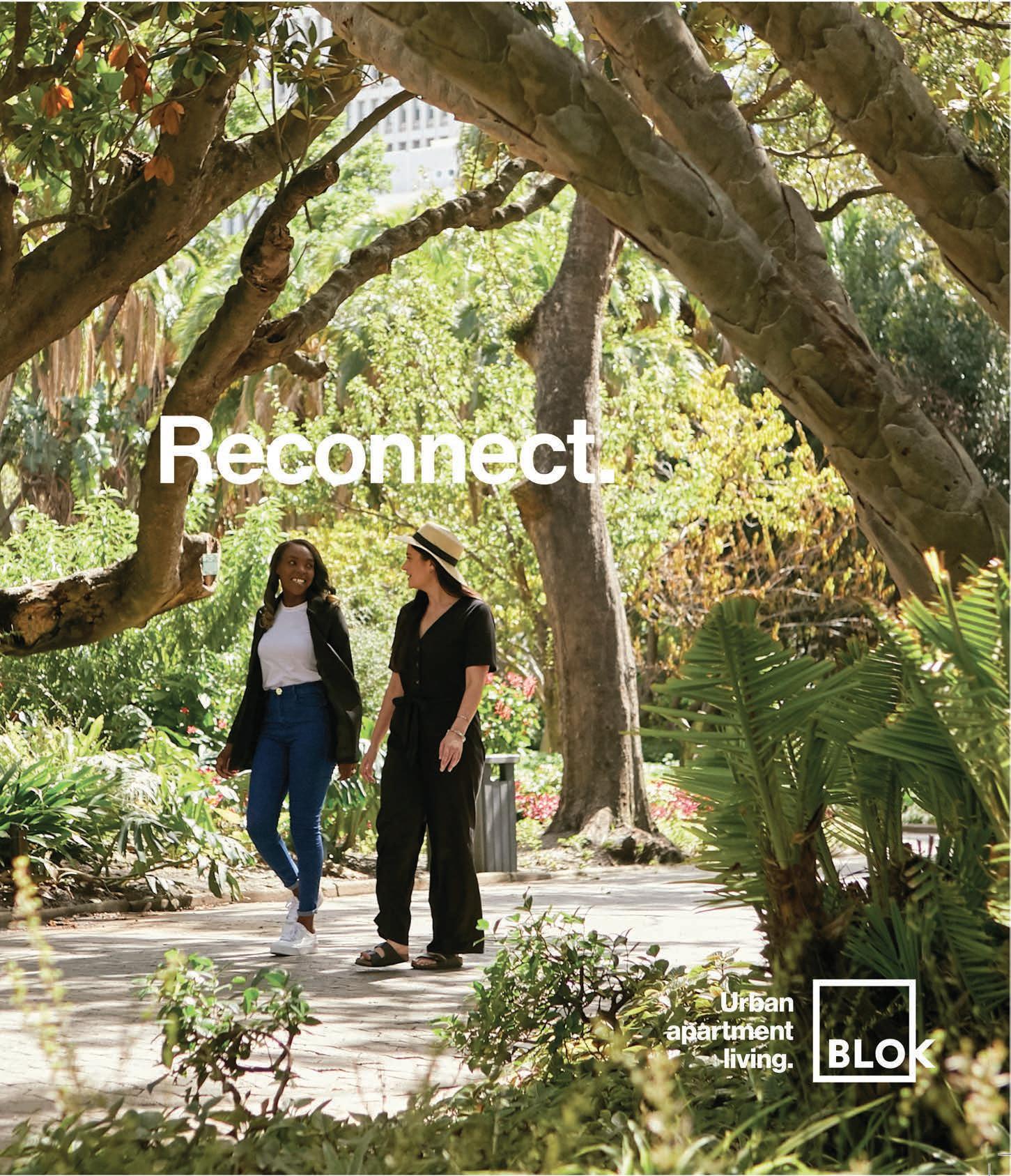
TIPS FOR INVESTING IN COMMERCIAL PROPERTY
ALISDAIR CROFTON, franchisee of Rawson Cape Town CBD
Commercial, shares that many investors are forming co-operative companies or investment groups to boost their collective buying power to diversify their property portfolios with a commercial component


The appeal of commercial property is easy to see. Commercial property returns can be five to eight per cent higher than residential property and risks are lower thanks to the longer commercial lease terms and the significant hassle of moving an established business to new premises.
WHERE TO START AS A NEW COMMERCIAL PROPERTY INVESTOR?
The first step is to familiarise yourself with market trends and opportunities. Popular commercial property types include office and co-working spaces, retail, industrial, hospitality, and even retirement communities. Knowing which types are doing well, what areas are up and coming, and where there might be gaps or opportunities
makes it much easier to narrow down which properties you might be interested in.
Working with a capable commercial broker can also help solidify your investment strategy before lining up potential options to investigate more thoroughly.
RISKS TO BE AWARE OF
Commercial properties can be less risky than their residential counterparts, but there are still several potential pitfalls – and risk mitigation strategies – to be aware of when investing.
Choosing to rely on a single tenant, for example, can be a risky decision, leading to zero income for several months if that tenant decides not to renew. It’s far less risky – although potentially more expensive – to invest in a property that can
IN COMMERCIAL PROPERTY, YOUR TENANT’S SUCCESS IS YOUR SUCCESS. THAT MAKES IT VITAL FOR INVESTORS TO CONSIDER ALL ELEMENTS THAT COULD INFLUENCE THEIR POTENTIAL TENANTS’ ABILITY TO THRIVE.
house multiple tenants in a variety of industries. That way, even if one or two don’t renew their leases, you still have cash flow from the others.
Cash flow is vital for commercial property owners with bonds, rates, municipal services and maintenance expenses. To prevent liquidity issues, we advise investors to prioritise the creation of an emergency fund to cover occasional vacancies and unexpected maintenance costs.
WHAT TO CONSIDER WHEN ASSESSING A PROPERTY
Once you’ve found a potential property, it’s time to do some digging.
The first thing is to check with town planning to confirm zoning and ensure your intended use is permitted. You should also confirm whether any overlay zones apply, as these supersede zoning conditions and could make an otherwise perfect property unsuitable for use.
If there are no zoning red flags, it’s time to put yourself in your intended tenant’s shoes to figure out how well a real business might perform in the space in question.
In commercial property, your tenant’s success is your success. That makes it vital for investors to consider all elements that could influence their potential tenants’ ability to thrive.
Things, such as traffic, foot traffic, parking, public transport access, local security and even neighbouring businesses, can all be pivotal, depending on the type of commercial tenants you hope to attract. Any environmental issues, such as extreme pollution or environmental protections, should also be investigated, as they could also impact the property’s use.
Having a professional commercial broker on your team can make a big difference in this process. We often provide insights that aren’t obvious from the outside and connect investors with information that may not be easily accessible. This enables more informed decision-making, helping our investors capitalise on opportunities and avoid nasty surprises down the line.
10 PROPERTY FINANCE AND INVESTMENT
Traffic, foot traffic, parking, public transport access, local security and even neighbouring businesses can all impact commercial buildings’ tenancy success.
Images: Rich Townsend/Istockphoto.com, Supplied
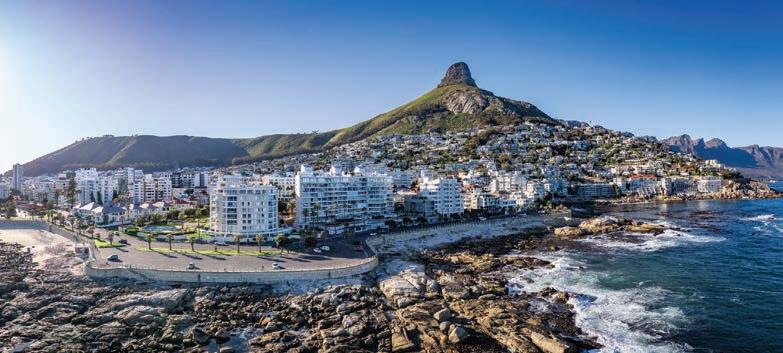
WESTERN CAPE COASTAL TOWN POPULARITY GROWS
We ask the experts why the Western Cape’s coastal towns are a good investment
SEA POINT PROPERTY
According to Jacques van Embden, CEO of Blok, Sea Point property offers:
1. Outstanding capital growth potential
According to Wesgro’s 2018/19 Western Cape Property Report, the area witnessed a temporary pause in 2018, followed by a resurgence in both freehold and sectional title prices in 2019. Notably, 45 per cent of recent buyers in Sea Point were young adults, and an additional 14 per cent were middle-aged, emphasising the area’s appeal to a diverse demographic.
The growth trajectory of Sea Point is staggering, with a remarkable 10.8 per cent annual increase over the last decade.
2. Fantastic lifestyle options and amenities
Beyond its investment potential, Sea Point offers a lifestyle that’s both vibrant and relaxed. Residents enjoy a holiday atmosphere close to globally recognised beaches, such as Clifton and Camps Bay. This family and pet-friendly neighbourhood also boasts excellent schools, shops, restaurants and a plethora of entertainment options.
THE CRITICAL ROLE OF TECHNOLOGY IN 2024 Permanent residency in the USA
As many South Africans look for ways to secure the future of their loved ones in the face of instability, the EB-5 Immigrant Investor Programme presents a remarkable opportunity for high-net-worth individuals in South Africa who aspire to immigrate to the United States of America.
The EB-5 Visa Programme requires an $800 000 minimum investment into a project that creates at least 10 full-time American jobs.
Below are a few examples of why high-net-worth (HNW) individuals from South Africa and their families choose to emigrate using the EB-5 visa programme:
1. Standard of education.
2. Safety and security.
3. A stronger economy.
4. To secure a prosperous future for their families.
Helping to guide investors in making this dream a reality is FirstPathway Partners (FPP), a well-established entity, since 2008,
in the EB-5 immigration through investment landscape. With an impressive track record and a meticulous approach to project selection and risk assessment, FPP ensures that investors are placed in projects with a high likelihood of success and capital preservation. Its unwavering commitment to transparency and accountability has established FPP as leaders in the EB-5 marketplace.
FPP’s regional manager for South Africa, Sonja Clarke, has years of extensive expertise in helping South Africans seek United States of America (USA) permanent residency and is ready to guide you and your family toward realising your American dream.
3. Location, location, location
Sea Point’s central location, approximately a 10-minute drive from Cape Town’s city centre, positions it as a highly sought-after destination for both living and working. The relaxed seaside atmosphere, coupled with breathtaking views of the Atlantic Ocean and the surrounding mountains, adds to its allure.
PLETTENBERG BAY
Steven Neufeld, manager principal of Lew Geffen Sotheby’s International Realty Plettenberg Bay, shares that Plettenberg Bay normally follows the Gauteng property market by about six months, but in this recent property cycle, Plett bucked the trend due to the big post-COVID-19-lockdown semigration and continued to climb during Gauteng’s downturn. Essentially, prices increased as stock decreased, but the market slowed considerably in the second half of the year, although stock levels are starting to recover. The average house price increased by a whopping 31 per cent in 2021 from R2.48-million to R3.9-million, then only by 9 per cent to R3.92-million in 2022, but last year it spiked again by 26 per cent to R4.84-million and although the average sectional title value rose by just 4.3 per cent to R1.8-million, in 2021, it hit double digits when the average selling price increased.
SPONSORED CONTENT

If you are keen to find out more, chat with Clarke about FPP’s latest EB-5 investment opportunity, TALUS, and discuss its generous EB-5 features. Reach out to Sonja today to embark on your journey towards permanent residency in the USA.
Contact:
Phone/WhatsApp: +27 83 408 5681
Email: sclarke@firstpathway.com.
FINANCE AND INVESTMENT
PROPERTY 11
Image: Supplied
Image: Pierrick Lemaret/Istockphoto.com


OFFSHORE REAL ESTATE INVESTMENT
Real estate investment has continuously emerged as a fertile ground for potential and lucrative returns. As the industry evolves, savvy investors keenly observe regions where promising opportunities beckon, writes ITUMELENG MOGAKI
Real estate investors searching for offshore investment opportunities might look at busy cities where there are lots of growth opportunities, or they might consider quiet suburbs that could be improved.
Jason Garner, a financial strategist at FinLink, says savvy investors often conduct thorough research before seeking out areas ripe for property investment, analysing factors, such as valuation (how much you pay for the asset), supply (how many are available) and demand (how many people want one), to make informed decisions.
Garner shares that while valuations are still elevated, the supply and demand imbalance in the European, United Kingdom and United States markets makes these markets attractive for international property exposure.
“Developed markets have been pushing infrastructure spending since COVID-19. This, coupled with a regionalisation drive to bring manufacturing back from China and green energy initiatives, means more diverse property investment opportunities available,” says Garner.
LOCAL VS INTERNATIONAL INVESTMENT
Addressing the key benefits of exploring offshore investment opportunities compared to domestic options, Garner says the weak rand against the USD (R3.62 to R19.00+ USD since 1994, a decline of 82 per cent relative to the USD dollar), coupled with a property rights policy, means the South African market is shrinking relative to abroad. “As new markets open, South Africa becomes more concentrated with potential property bubbles and shocks.”
Phil Robotham, head of SA Wealth Client Group at Schroders Investment Management, says that by investing some assets outside South Africa, investors can achieve geographic diversification, which can help protect savings and lower the volatility of their portfolios.
“Investing offshore can also offer an opportunity for investors to gain exposure to global investment themes that aren’t necessarily attainable in South Africa. For example, high growth sectors, such as pharmaceuticals, biopharmaceuticals, aerospace and technology,
“INVESTING OFFSHORE CAN ALSO OFFER AN OPPORTUNITY FOR INVESTORS TO GAIN EXPOSURE TO GLOBAL INVESTMENT THEMES THAT AREN’T NECESSARILY ATTAINABLE IN SOUTH AFRICA.” – PHIL ROBOTHAM
are under-represented in our domestic stock market,” says Robotham.
From a real estate perspective, Robotham says South Africa’s cities perform poorly on Schroders’ Global Cities Index, an index ranking global cities according to their economic dynamism and investment potential. “Investing in offshore-listed real estate could offer South African investors a chance to gain exposure to cities overseas with potentially better growth and investment prospects than available in South Africa,” says Robotham.
Linda Eedes, investment executive at Foord Asset Management, says South African investors need to consider the long-term impact of a depreciating rand on the value of their capital.
“Given structural headwinds, this trajectory is unfortunately unlikely to materially change over the longer term, although there may be brief periods of rand strength along the way. Investing outside of South Africa not only provides a wider opportunity set to select from, but also helps protect the value of investors’ capital by investing in non-rand denominated assets and in companies that generate their revenue in hard currencies,” she explains.
Commenting on how offshore investments contribute to regional economic development, particularly in emerging markets, Eedes says: “Offshore investment into emerging markets drives regional economic development by injecting capital for infrastructure, fostering job creation and stimulating industries. These investments introduce advanced technologies and management practices, enhancing local productivity and competitiveness.”
Additionally, Eedes shares that these investments may open new markets for local goods and services, boosting sales and diversification. By fostering competition, offshore investments can also encourage innovation and efficiency among local businesses.

FINANCE AND INVESTMENT PROPERTY 13
RE AD GLOBAL CITIES INDEX
Images: fazon1/Istockphoto.com
MARKET TRENDS FOR PROPERTY INVESTMENT
ITUMELENG MOGAKI talks to Matseleng Mogodi, principal agent at Snooks Estates, who shares the 2024 top ve market trends investment professionals need to note
1. Sectional title or freehold?
According to Property24, there has been a general upward trend in the number of freehold properties sold in Johannesburg, exceeding the number of sectional title sales in the same period (2019–2023). Nevertheless, due to lifestyle choices, many young South Africans have opted for more sectional title living, as it allows lock-and-go, safety and security at affordable prices.
2. Rental trends
Although there has been a huge impact on current homeowners due to unrelenting interest rates and the socio-political disruptions exacerbated by the low economic growth, the current market is attractive for investors seeking more properties to buy for rental purposes.
TAX LAW
3. Semigrating
It seems as though a vast number of people are moving from Gauteng to the Western Cape. This has negatively impacted residential and commercial property growth in Gauteng and other provinces. According to Lightstone, this trend started gradually increasing from 2015, dipped from 41 to 37 per cent between 2017 and 2018, but has since been growing gradually.
4. Property practitioners leaving the industry
There could be several reasons why more property practitioners are throwing in the towel. Currently, there are 26 198 property practitioners in South Africa. One of the biggest reasons is the current tough economic times.

5. Stokvels
Stokvels have proven to be one of the success stories for communities that can leverage their collective efforts to build property portfolios as groups. It’s a form of forced savings that can enhance growth for individuals and their families. Stokvels bring hope to the majority of people who may otherwise not have been able to purchase on their own or who lack the wisdom and discipline to save for property investments.
THE CRITICAL ROLE OF TECHNOLOGY IN 2024
Tips for understanding tax law within the commercial property sector. By ITUMELENG MOGAKI
Investing in commercial properties in South Africa, according to Devakalyani Moodley, senior manager at Mazars South Africa, can be a lucrative venture. However, she cautions that investors should ensure they understand the intricacies of the South African tax laws governing the commercial property sector.
“Understanding the complexities of South Africa’s tax laws is crucial for optimising returns and minimising liabilities,” says Moodley.
She shares key tax law considerations for investing directly in commercial property:
• Income tax: rental income from commercial properties is subject to income tax. Investors can reduce taxable rental income by claiming deductions for expenses, such as maintenance, repairs and rates.
• Capital gains tax: this is applicable upon the sale of commercial properties. Investors should familiarise themselves with calculation methods, exemptions and rollover relief provisions contained in the Income Tax Act when disposing of commercial properties.
• Incentives: the Income Tax Act offers tax incentives for investors in commercial properties situated in designated urban development zones. Exploring these incentives can provide significant advantages for investors.
• VAT and transfer duty considerations: depending on the circumstances, VAT or transfer duties may be applicable to the sale or lease of commercial properties. Investors should understand the VAT implications, registration requirements and input tax claims manage cash flow to effectively. An important consideration is the structure of lease agreements, as this could impact an investor’s VAT obligations and allowable deductions.










• Alternative investment: An alternative to directly investing in commercial property would be to invest through Real Estate Investment Trusts (“REITS”). REITS offer opportunities to investors who do not want the responsibility of managing the property, but own interests in the underlying property through a shareholding in listed companies that own the properties. Locally, there are special rules in the tax legislation that apply to REITS. REITs are an efficient way to invest in real estate without the underlying obligations of direct ownership of a property.







“By comprehensively understanding these tax considerations and structuring investments accordingly, investors can optimise their commercial property ventures. Consult with tax professionals specialising in commercial property taxation to help navigate complex tax issues,” concludes Moodley.




14 PROPERTY FINANCE AND INVESTMENT
Matseleng Mogodi
Images: Supplied Devakalyani Moodley

R ABIE PROPERTY GROUP CONTINUES TO GROW ITS PORTFOLIO
RABIE PROPERTY GROUP is celebrating over 45 years of experienced property development in the Western Cape. With many award-winning residential and commercial developments under its belt, Rabie continues to shape the urban landscape of Cape Town with multiple landmark developments
This year marks 20 years of Rabie’s involvement in the Century City mega-development. The company acquired the site in 2004 and, over the past two decades, has transformed it into a sophisticated and smart mini-city, attracting a cross-section of local and international investors, global corporations, residents and visitors. “Cape Town is one of the most sought-after destinations in the world,” says Rabie director John Chapman. “People want to live, work and play here. Companies want to be based here. It’s the place to be.”
NE W LIF E FOR O LD RATANGA JUNC TION
In recent years, Rabie has revitalised and restored the ex-Ratanga Junction site, transforming it into a lush green park with an investment exceeding R100-million.
“CAPE TOWN IS ONE OF THE MOST SOUGHT-AF TER DESTINATIONS IN THE WORLD. PEOPLE WANT TO LIVE, WORK AND PLAY HERE.” – JOHN CHAPMAN
Renowned for its landscaping across all development projects, Rabie’s focus on indigenous planting within the park has been to create sustainable green corridors to support and attract a variety of plant and animal life. Named Ratanga Park, this is the most recent and significant addition to the greater new Bridgeways precinct within Century City and serves as the focal point for existing and upcoming developments alongside the park’s perimeter, which is connected to 8.5km of Century City’s canals.
PROPERTY 15
Century City, Cape Town

Ratanga Park is emerging as a modern and idyllic urban oasis that seamlessly blends tranquillity with urban convenience.
Bridgewater, the first mixed-use development set on the edge of the park, was built in 2020 and comprises apartments and office spaces along with a hotel and restaurants overlooking the park.
This secure precinct offers walkable proximity to an extensive and impressive array of lifestyle amenities, including a growing list of five hotels, thirteen restaurants, three gyms, world-class conferencing facilities and easy access to Canal Walk Shopping Centre, the largest shopping mall in Cape Town. Those frequenting the park can enjoy the urban water frontage and view art by Anton Smit and other artists profiled within the Century City Art Trail, or journey through the park on the Century City’s custom-made tram.
The success of Ratanga Park within the Bridgeways precinct is the result of innovative urban planning and is inspired by the principles of new urbanism, evolving the ideals of traditional village models. This approach,
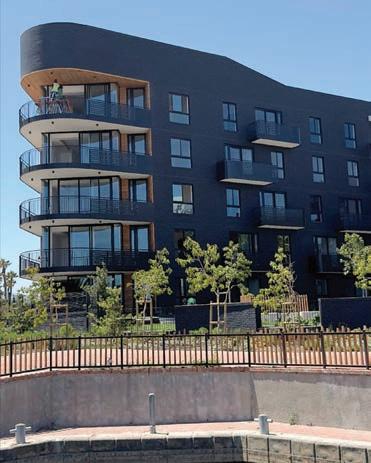
championed by Rabie, promotes inclusive, sustainable and dynamic urban spaces that offer residents a smart neighbourhood concept where all essential amenities are within easy reach and set within a lush urban oasis.
RATANGA PARK IS EMERGING AS A MODERN AND IDYLLIC URBAN OASIS THAT SEAMLESSLY BLENDS TRANQUILLITY WITH URBAN CONVENIENCE.
PREMIUM S ECTIO NAL TITLE NIN E PALMS A HUG E SUCC E SS
Following the success of Bridgewater, Nine Palms launched in May 2022 as the first residential development set on the edge of the park and sold out in record time. The original nine palms, planted 30 years ago at the ex-theme park, were retained and stand proudly in the large, private and northwest-facing Nine Palms Garden, which is connected directly to the newly revitalised urban wharf edge.
“Nine Palms was very well-received from the start,” says Rabie director Mariska Auret. “We had record sales at launch, with the last of 131 units sold before topping out on the structure in March 2023. This success underscores the high demand for premium sectional title developments set within smart
16 PROPERTY
Bridgewater
Nine Palms


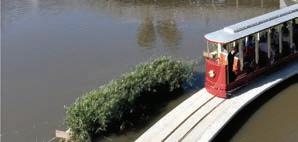

and secure, exceptionally managed precincts like this one.”
New owners could move in from December 2023, and astute property investors are already reaping rental rewards. Devon Usher, CEO at Property World, notes: “We have seen numerous profi table res-sales already taking place. The ever-growing reality of semigration to the Western Cape along with rising property values and the established desirability of our Ratanga Park location has favoured well for investors, who are receiving excellent rental returns and multiple tenant applications per apartment.” The Property World offi ces are set on the edge of Ratanga Park, making this the ideal place to meet an agent and view development progress in the park.
FOCUS ON ENERGY EFFICIENCY AND SUSTAINABILITY
Rabie has achieved Green Star ratings for many of its commercial projects and is now aiming for energy effi ciency and sustainability measures in all residential developments. Nine
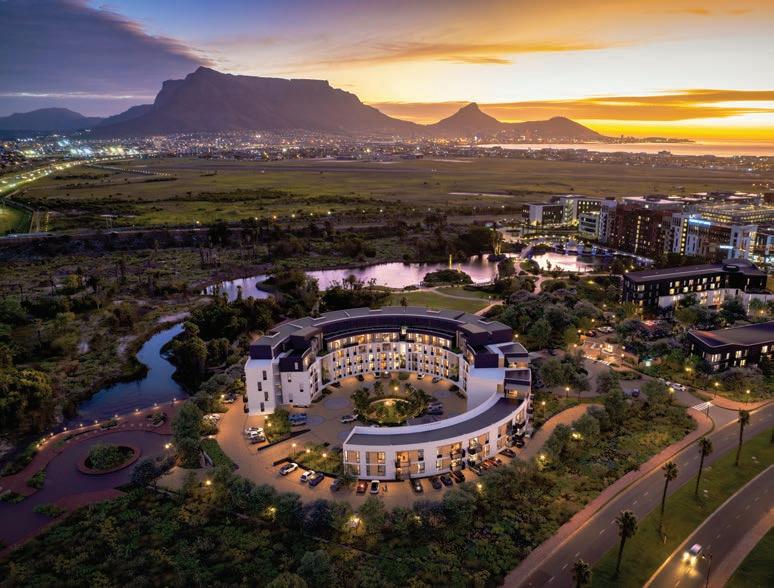
RABIE HAS REVITALISED AND RESTORED THE EX-RATANGA JUNCTION SITE, TRANSFORMING IT INTO A LUSH GREEN PARK WITH AN INVESTMENT EXCEEDING R100-MILLION.
Palms is expecting an EDGE (Excellence in Design for Greater Effi ciencies) certifi cation from the Green Building Council of South Africa. ON PARK, Rabie’s second residential offering in Ratanga Park, launched in 2023 and currently under construction, is also aiming for EDGE certifi cation.
This circular pavilion building promises a smart lifestyle with full backup power and comprises 125 units, including studios, one- and two-bedroom apartments and penthouses. “Currently, only four ground-floor garden apartments are still available for sale,” says Usher. “These are ideal for those wanting the use of an enclosed exclusive-use garden with extended views of the park.” This residential building will boast modern architecture with superb interior finishes.
One of the benefi ts of purchasing property off-plan from Rabie is that buyers can select their fi nishes from an expertly chosen palette of interior design features. Other benefi ts include fi nancial savings with no transfer duty payable and capital appreciation over the course of the construction period.
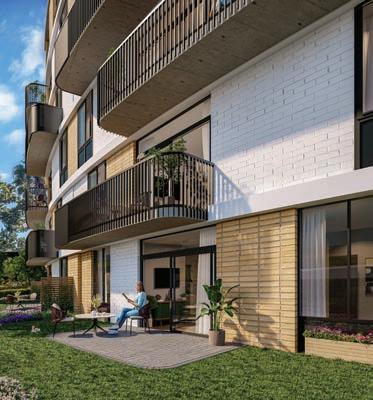
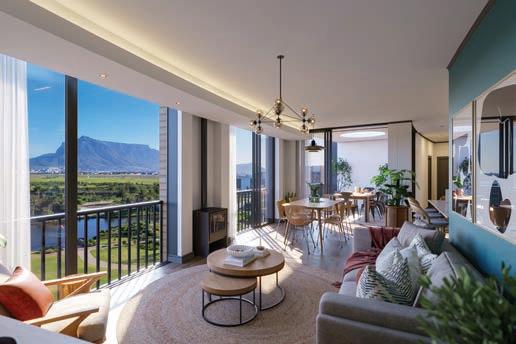
PROPERTY 17 ADVERTORIAL RABIE PROPERTY
ON PARK
Residents benefit from spectacular views of Ratanga Park and iconic Table Mountain
ONE FOR THE WA TER L OV ER S
Rabie is launching a third residential development – Park Place – within Ratanga Park in May 2024. This north-facing development will comprise two premium apartment buildings with views over the park’s expansive 1.64 hectares of water body, providing exclusive and common-area water frontage. Ratanga Park residents and visitors can enjoy the canals with activities, such as canoeing, kayaking or stand-up paddling. The park is also connected to the 16-hectare Intaka Island nature reserve.
Park Place will deliver excellent security, full backup power during load shedding and exceptional lifestyle amenities within the development itself, including a clubhouse
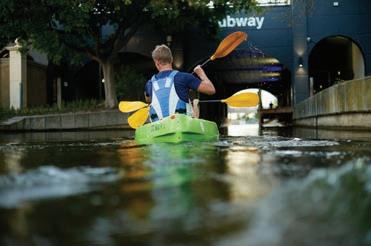
and a sparkling swimming pool. “With the launch of Park Place, we are poised to meet the demand for property investment within Ratanga Park,” says Auret.
“With the launch of Park Place, we are poised to meet the demand for property investment within Ratanga Park.” – Mariska Auret
In another nod to the site’s history, a 12 000m 2 commercial development, Junxion Park, will be built to provide flexible office spaces and a restaurant – making this the ideal location for organisations seeking a secure and stylish location close to all lifestyle amenities and set within nature.
IN GOOD HANDS
Ratanga Park is maintained meticulously by the Century City Property Owners Association (CCPOA), which operates as a mini municipality. All owners at Century City automatically become members of the CCPOA to ensure the continued advancement of the precinct, benefitting from each estate’s individual security measures as well as the greater security offered by the precinct’s management. With smart technology measures, such as number plate and facial recognition, and traffic control and emergency response teams in place, those
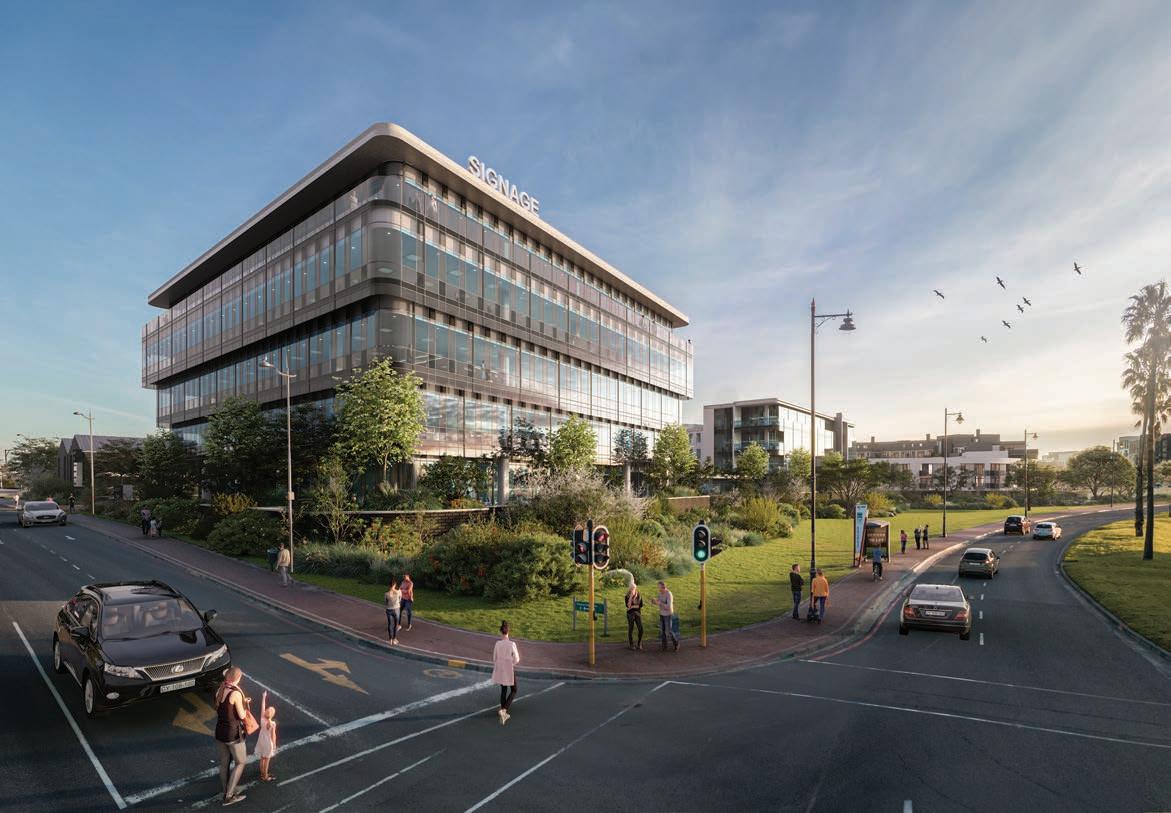
18 PROPERTY ADVERTORIAL RABIE PROPERTY
Junxion Park, Century City, Cape Town

investing and residing here can rest assured they are in good hands.
Century City has launched a mobile application that provides customised features, including quick access to the latest news and blogs, event notifications, smart city updates and an ability to either phone the Service Operations Centre from the app or log a call or incident via the reporting function.
B EYO ND C ENTU RY CITY
“Outside of the continued impact within Century City, Rabie is instrumental across multiple pockets of the Western Cape and has been the controlling developer of the up-and-coming Burgundy Estate suburb since 2015,” says Rabie director Miguel Rodrigues.
This suburban pocket is based in Milnerton and positioned at the foothills of Durbanville’s hills. Situated closely to Cape Town’s central business district, it comprises several successful and secure gated community estates – each with its own amenities and security measures in place. “With its location and robust road infrastructure, connecting it to the Atlantic and Western Seaboard and both the northern and southern suburbs of Cape Town, Burgundy Estate offers unbeatable lifestyle value,” concludes Rodrigues. The suburb boasts over 4 800 front doors.
“Outside of the continued impact within Century City, Rabie is instrumental across multiple pockets of the Western Cape.” – Miguel Rodrigues
Rabie has developed multiple secure estates within the suburb of Burgundy Estate, such as Quinta, Vermont, Bow-Tie, The Vineyard, and
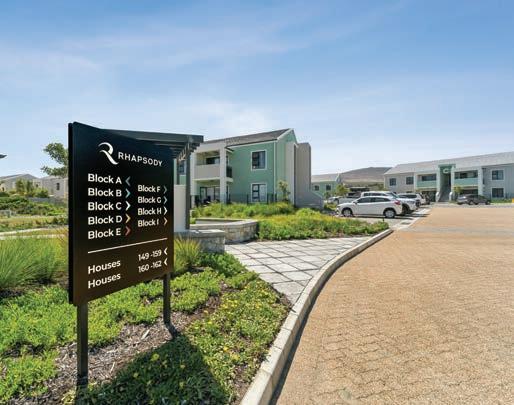
many more. The suburb is home to beautifully landscaped security estates, indigenous landscaping, walking trails and pocket parks, a serene greenbelt and lakes, creating a calming environment for residents to relax and unwind.
For those who enjoy an active lifestyle, there are fitness centres, tennis courts and a golf course. The community’s clubhouse is another highlight, offering a place to socialise and connect. The layout of this suburb with gated estates, excellent amenities and central location make Burgundy Estate highly desirable to investors and those looking to move to the Western Cape from other provinces in South Africa.
Recent developments by Rabie include Junixe, a secure gated community comprising 96 freestanding two- and three-bedroom homes, all with two bathrooms, sitting on 3.7 hectares.

ADVERTORIAL RA B IE P RO P ERT Y
Rhapsody in Burgundy Estate, Cape Town
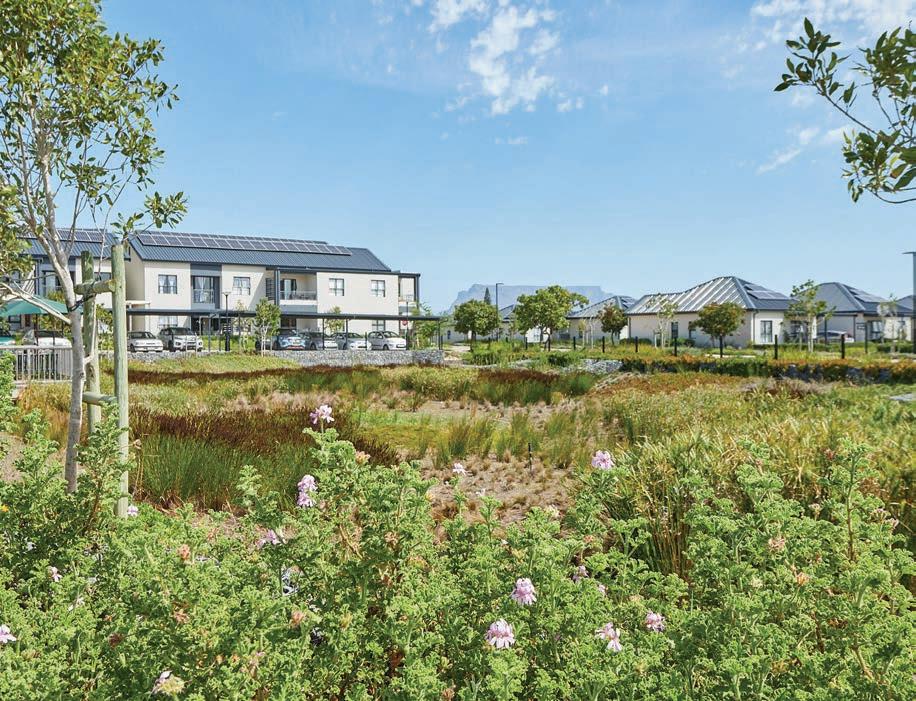
Residents have exclusive-use gardens and can enjoy a communal park, walking paths and well-designed landscaping throughout the estate. Currently, there are only three houses still available. Rhapsody is the newest addition to this mix of secure estates, with multiple apartment buildings set spaciously apart alongside 14 houses.
This gated and secure development features a communal swimming pool and braai area, pocket parks for children to play safely and wide green open spaces. The site is bordered by Carmine Drive and Cinnebar Street in Burgundy Estate. Rhapsody will deliver 110 front doors, of which only 25 units are still available for sale.
LIF E R IGH T RET I RE MENT OPT IO NS
Burgundy Estate is also home to Oasis Life’s largest retirement village with outstanding amenities, including a bowling green. Oasis Life, Rabie’s retirement brand, launched in 2018 and is based on the Life Right model of retirement and protected by the Retirement Persons Act in South Africa.
Oasis Life includes a fast-growing number of retirement communities, launching first at Clara Anna Fontein in Durbanville and then at Burgundy Estate. The brand launched in the southern suburbs of Constantia in March 2023 and sold out most units before construction commenced, with just two apartments and three houses still available. This incredible rate of sale illustrates the winning formula of Oasis Life, which is now well-known for
its demonstrated success in the Cape. In September this year, Oasis Life will launch in Sunningdale on the Western Seaboard, and there is already huge interest and a growing database, months before launch.
The Life Right model of retirement is very beneficial for seniors, particularly since the maintenance of the property and security are taken care of by the Oasis Life management team, appointed by Rabie. This provides the ultimate lock-up-and-go solution. At Oasis Life, residents can enjoy the privacy of their own homes without needing to mow lawns, fix leaks, clean pools or cook every meal. At the heart of each estate is a clubhouse with a restaurant, bar, deli and a fitness centre.
Glyn Taylor, CEO of Oasis Life’s growing basket of estates, notes: “Service and
hospitality are the golden thread that intertwines and connects our estates across Cape Town. The welfare and contemporary lifestyle of our community is our top priority, which is why our best-in-class facilities are run by service-minded people trained to hotel industry standards. This ensures a resort-type retirement.”
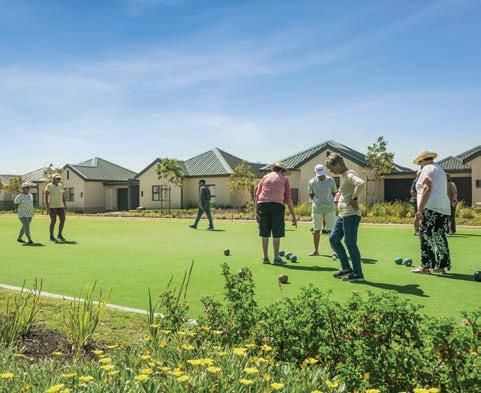

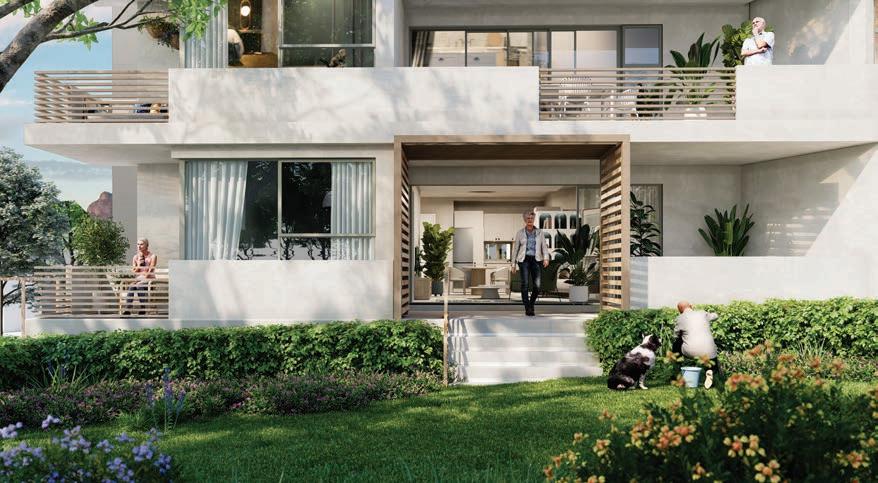
20 PROPERTY
Oasis Life Burgundy Estate
Oasis Life Constantia

Oasis Life Clara Anna Fontein is sold out and Oasis Life Constantia is nearly sold out. Oasis Life Constantia, situated off Old Kendal Road and close to Constantiaberg Mediclinic, comprises freestanding houses and three low-rise apartments. Oasis Life Burgundy Estate is the largest estate, sitting on 10 hectares of land, and offers a wide product mix with low-rise apartments, cottages and houses. “We’ll have 330 front doors when finally completed,” says Rodrigues.
PREMIUM OFFERINGS TO MEET THE NEEDS OF THE LOCAL COMMUNITY
Nearby in Durbanville, Rabie continues to deliver premium real estate in joint venture with Trinity Projects. Wheatfi elds Estate, set on the edge of Groot Phesantekraal, is virtually sold out and comprises freestanding and duplex homes set within a gated estate. Low “werf” walls separate individual homes from the estate’s landscaped verges. The design of this development boasts wide internal roads, demarcated pedestrian and cycling lanes, family communal play parks and architecturally designed landscaping to promote tranquillity, wellbeing and a sense of community.


community and the existing amenities within the surrounding suburb.”
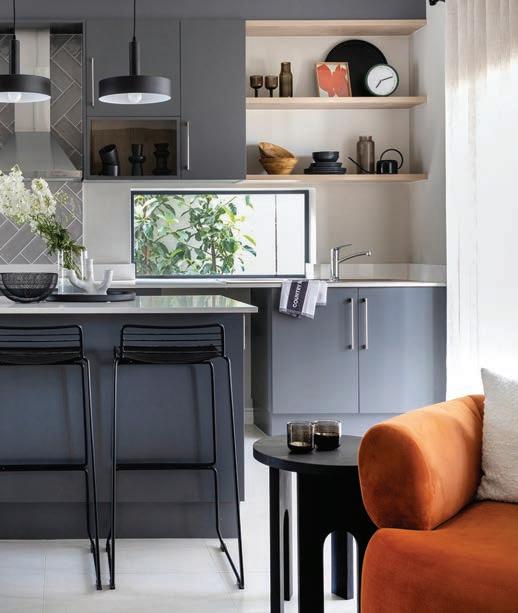
RA BIE


OASIS LIFE


Scan

Following this success, Rabie is launching Klein de Koning, a set of duplex homes, situated nearby, in June 2024. Colin Green, director at Rabie, says: “We take the location of each development into consideration when considering the style and blend of facilities within each estate, looking to the needs of the local
In Kuils River, a new family oriented and pet-friendly development is currently under construction in the northern suburbs, offering free standing single storey and duplex homes with a variety of fl oor plans to choose from.
Rabie will continue to develop connected, smart spaces that offer the ideal trifecta of residential neighbourhoods, modern workplaces and exceptional retail and hospitality districts. Images: Supplied
For more information: info@rabie.co.za
www.rabie.co.za
info@oasislife.co.za
www.oasislife.co.za.
PROPERTY 21
Scan to visit Rabie Group’s website
for more about Rabies’ retirement offerings
Stonepine Crescent in Kuils River, Cape Town.
Wheatfields Estate
TRENDS IN LOGISTICS AND WAREHOUSING
Commercial property is booming in South Africa as the logistics industry expands rapidly, writes TREVOR CRIGHTON
The South African freight and logistics market is estimated to have added R409.7-billion to the country’s economy in 2023, while online retail sales are expected to more than double that contribution to R875.38-billion within two years, according to a Mordor Intelligence report.
Largely driven by an increased demand for on-hand stock that became a requirement for deliveries during the COVID-19 pandemic, large warehousing and logistics-friendly spaces are leading the way.
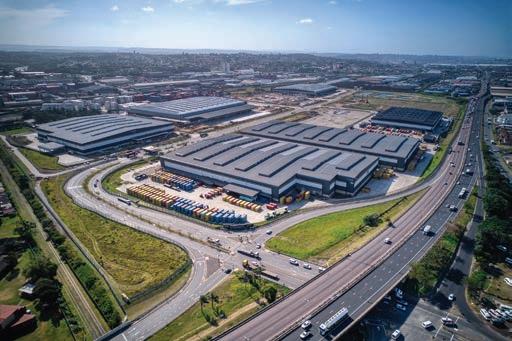
COMMERCIAL TRENDS
Galetti Corporate Real Estate managing director Simon Wilkins agrees that the continued rise of e-commerce and the relative stability of the industrial commercial real estate class has led to increased demand for warehousing as a place to both manufacture and store goods to be shipped.
“In places such as Cape Town and Durban, which are major ports for those engaging in e-commerce, vacant warehousing space Is scarce, leading to high competition and increased prices per square metre. We’ve observed a notable surge in demand for extensive warehousing solutions within our clientele,” he says. “Over the past 18 months, our transactions in industrial leases have exceeded R2.8-billion,
encompassing more than 500 000 m2 of gross leasable area (GLA) across South Africa.”
Jason Cooper, head of developments at Fortress Real Estate Investments Limited, says customers are increasingly focused on compliance, functionality, energy efficiency and security at commercial developments.
“The compliance aspect has largely been driven by the insurance industry and its stringent requirements regarding fire systems,” he explains. “Functionality relates to good vehicular circulation on site and modern designs that maximise the volumetric capacity of new warehouses. We also provide 24-hour security at our industrial parks. When it comes to energy efficiency and security, corporate governance requires energy savings and security, in addition to business continuity because of power interruptions.”
GROWTH POTENTIAL
Wilkins points out that clients within the logistics sector consistently outperform other industrial real estate industries. “Much of this sector’s success stems from the resilience and adaptability they showed during the global supply chain disruption of the pandemic,” he says. “These kinds of clients traditionally value space over modern conveniences and finishings and will develop existing structures according to their operational needs with permission from landlords.”
Bruce Collins, head of asset management at Fortress Real Estate Investments Limited, says that Fortress has noted that demand for recently completed logistics assets has come primarily from distributors of commodities (such as pulp and polymers), providers of healthcare and retail inventory such as food and clothing retailers.
“The top three industries by GLA are food, commodities and healthcare – for example, the newly built 164 000 m2 Pick n Pay Distribution Centre at Eastport Logistics Park – and a 3PL representing Tiger Brands has recently extended their lease agreement due to the proximity to the Pick n Pay DC.”
“IN PLACES, SUCH AS CAPE TOWN AND DURBAN, WHICH ARE MAJOR PORTS FOR THOSE ENGAGING IN E-COMMERCE, VACANT WAREHOUSING SPACE IS SCARCE, LEADING TO HIGH COMPETITION AND INCREASED PRICES PER SQUARE METRE.” – SIMON WILKINS
FAST FACT
Cipla South Africa signed a 10-year lease extension agreement last year with Fortress for its 18 214m ² distribution centre in Rivergate, Cape Town, mainly because of the energy security plan implemented by Fortress. Earlier this year, Fortress completed the installation of a 625kwp system, which includes 1 118 rooftop-mounted solar panels.
Source: Fortress
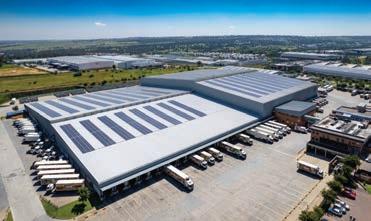
“With the continued growth of online shopping, there is a growing need for warehouses located closer to urban centres to facilitate faster delivery times. The demand for temperature-controlled storage facilities is also increasing as more companies expand into food and pharmaceutical distribution,” says Wilkins. “Lastly, fulfilment centres that integrate automation and robotics are becoming increasingly important to meet the demand for faster order processing and delivery.”
MORDOR INTELLIGENCE REPORT

22 PROPERTY INDUSTRIAL
RE AD
Galetti Corporate Real Estate has found that prospective growth areas in the industry include distribution centres, cold storage facilities for perishable goods and fulfilment centres for e-commerce companies.
Images: Supplied
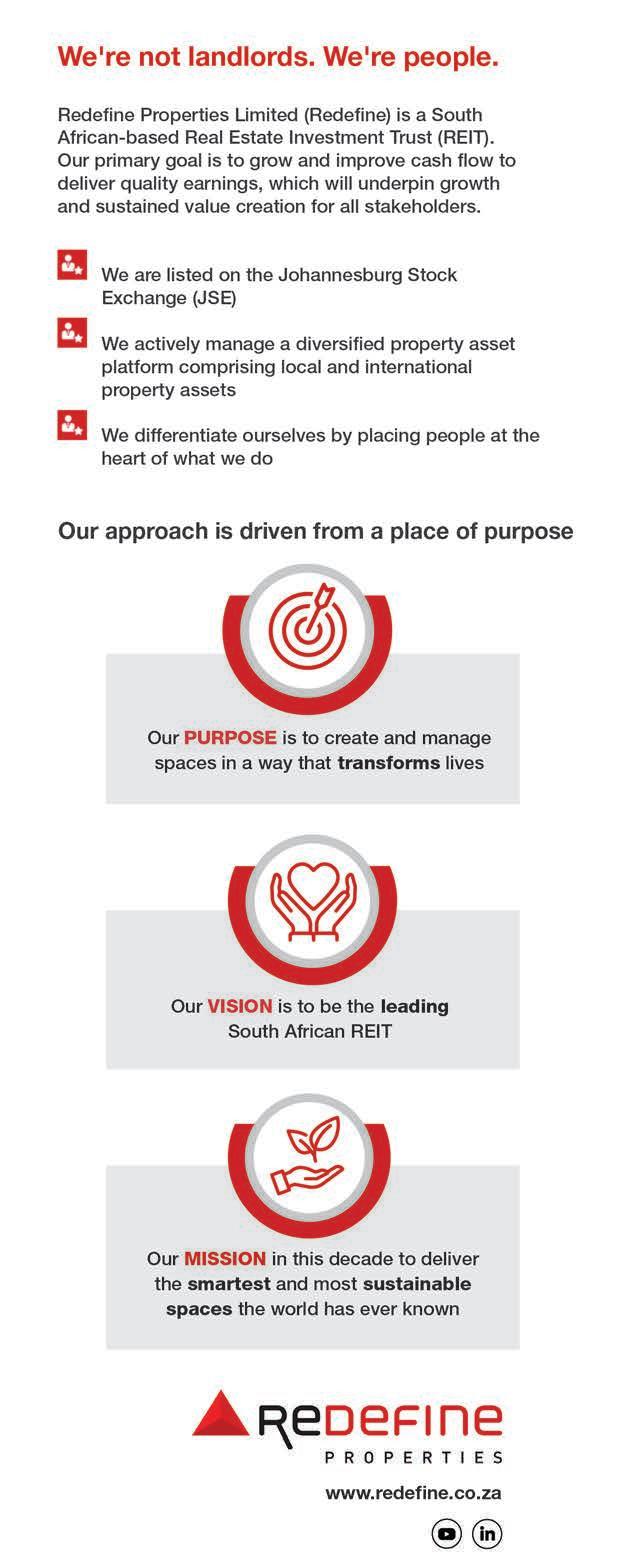

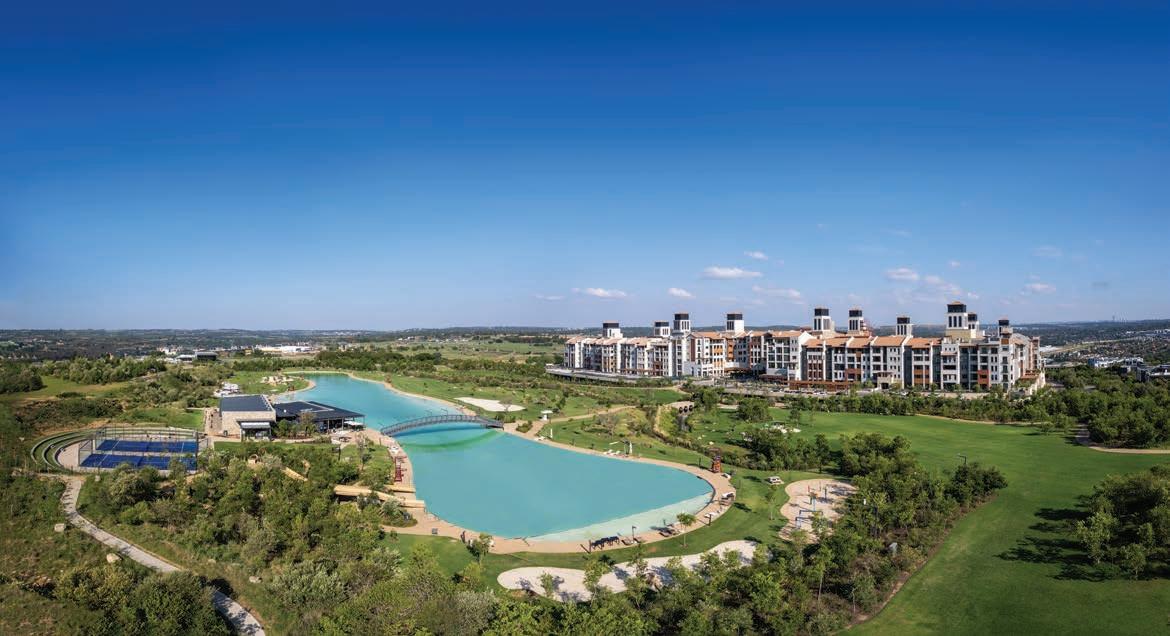
ESCAPE THE JOBURG HUSTLE: INVEST IN STEYN CITY

STEYN CITY offers residents the optimal combination of work, live and play in a beautiful and secure environment


When every day feels like a fi ght against the clock, and we face one obstacle after another, it’s refreshing to know there is a lifestyle residential estate designed specifi cally to eradicate these time pressures.
Every aspect of Steyn City has been created to add extra minutes to your day, allowing you to live the life you want – whether you’re an entrepreneur with your eye on the hustle or an executive for whom every second counts.
It all comes down to convenience. At Steyn City, convenience means never having to leave the front gates because a solution for every possible need is right on your doorstep. That includes everything from your daily offi ce commute and the school run to your favourite pastime, dining out and even security.
WORLD-CLASS AMENITIES
Steyn City’s wide range of world-class amenities means you can choose your favourite way to get fit or enjoy your downtime right on-site. The estate’s 18-hole Nicklaus design championship golf course stands out here. One of the most sought-after in Gauteng, thanks to its challenging layout and seven-star service, the course is complemented by an award-winning clubhouse
EVERY ASPECT OF STEYN CITY HAS BEEN CREATED TO ADD EXTRA MINUTES TO YOUR DAY, ALLOWING YOU TO LIVE THE LIFE YOU WANT.
with a beautiful terrace (the perfect spot to enjoy a light bite and sundowner with a stunning view) and a Pro Shop offering a wide range of leading local and international brands. Here, you’ll also find 19 by Michael, a favourite among residents. Its extensive menu encompasses everything from traditional dishes to classic cheeseburgers and sushi platters. Book one of the boardrooms for your next corporate think-tank, and 19 by Michael will take care of the catering. After a productive day of brainstorming, you can relax on the tees. And if you want to entertain your clients on the greens, where better than at your club?
If you’re not one for the greens, maybe you prefer time out in the saddle. Choose one of the horse trails traversing Steyn City’s magnificent 2 000-acre indigenous planted parkland, or start your day with an early morning training session. The well-equipped clubhouse allows you to shower before heading to the offi ce, or on the weekend,
grab a meal, sit back and enjoy watching the horse-riding action.
Many people neglect their exercise regime because it is too diffi cult to squeeze in a sweat session after work. Not at Steyn City – the estate’s 45km promenade is fl oodlit and completely safe due to stringent security measures, so you can schedule your run or walk after dark.
Cyclists are at home here too. It’s often a hassle to load your bike and trek out to a secluded place where you can cycle uninterrupted. Steyn City’s answer is a 50km MTB track, so well designed that it is used frequently for major events, such as the 947 Ride Joburg MTB race. It is completely safe and just a few steps from your door.
Steyn City also offers an indoor aquatic centre and a 300m lagoon. Although the latter facility is also known as a fantastic place to kick back and enjoy the weekend, it makes the estate an ideal destination for triathlon training.
You’ll fi nd many coffee shops dotted throughout the estate. Get your post-ride caffeine boost at Seattle Coffee Company, located at the piazza at Steyn City’s fl agship apartment development, City Centre, or at the lagoon itself. Each outlet is equipped with
24 PROPERTY ADVERTORIAL STEYN CITY


STEYN CITY’S WIDE RANGE OF WORLD-CLASS AMENITIES MEANS YOU CAN CHOOSE YOUR FAVOURITE WAY TO GET FIT OR ENJOY YOUR DOWNTIME RIGHT ON-SITE.
Wi-Fi so you can check your emails or log into your next meeting.
The lagoon is also where you can enjoy a full day of watersports (think kayaking, SUP boarding and pedaloes), or a game of padel – the new courts boast a spectator amphitheatre and fully equipped cloakrooms so you can freshen up afterwards. After all that action, fill up at The Family Table restaurant, which presents a menu of stunning Mediterranean-inspired fare. Highlights include souvla grill (delectably grilled lamb, chicken or beef served with dips and salads) and shawarmas. Alternatively, book your braai pod, order your favourite sides and light up the coals. Steyn City will do everything else for you, from providing the braai implements to cleaning up. Or, if you’re in more of a snacky mood, browse the treats and goodies at The Family Pantry.
Other facilities at Steyn City include a fully equipped gym, floodlit tennis courts, several resort pools and a number of outdoor workout stations. These are located alongside the children’s play nodes within the parkland, so you can get your workout while spending time outdoors with the family – multitasking at its best.
Time to refuel? The Pizzeria will take care of your dinner and does home deliveries. If you’re looking for a fabulous venue for a children’s party, special occasion or family brunch, make a reservation at The Farmhouse, where lunch is served under the trees. You’ll even find Paul’s Homemade Ice Cream on-site, beckoning those with a sweet tooth.
WORK AND SCHOOL HASSLES SIMPLIFIED
With so much to do all in one space, planning leisure time becomes so much easier. But what about work and school?
Steyn City has removed the stress from these activities, too. AAA-grade offices are available to lease at Capital Park. Strategically located on the R511, Winnie Mandela Drive, which links Johannesburg, Midrand and Pretoria, these offices range in size from 150m2 to 1 400m2 – perfect for growing start-ups and established corporates. The precinct’s environment specifically warrants mention: surrounded by a greenbelt, it makes for a conducive and inspiring workplace and the rooftop terraces are ideal for social functions.
Then there’s Steyn City School: a forward-thinking campus catering to learners at pre-school, prep and college stages. Careful planning has ensured that it’s not only the curriculum that is geared towards equipping children for a digital future; even the facilities, from the classrooms to the media hub, auditoriums and multisport courts, are intended to bring out their best.
With the campus so close, you can say goodbye to the daily commute – or book the internal resident school shuttle to save even more time. And as for driving across town to extramurals, that, too, becomes a thing of the past as the estate’s considerable facilities (including golf and horse riding) may be accessed by Steyn City learners, too.
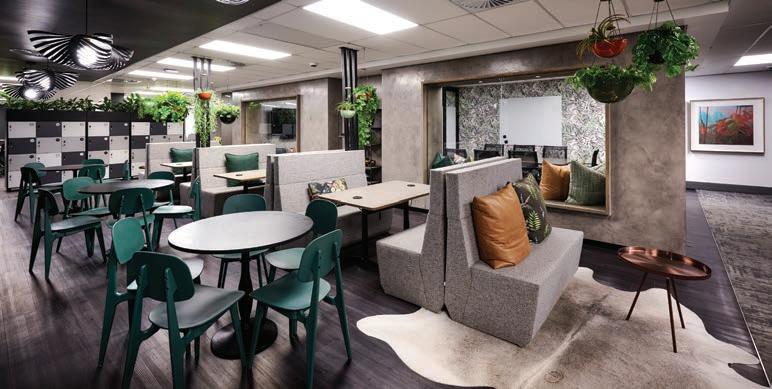
If that’s not enough, Steyn City’s Ultimate Helistop puts any destination within easy reach, from meetings on the other side of town to that special weekend getaway spot. This impressive venue boasts a meeting room, pause lounge and cloakrooms, making it easy for people who need to host a quick meeting before moving on to their next engagement.
SPECTACULAR SETTING, SECURITY AND HOMES FOR ALL PREFERENCES
All these offerings are set against one of Gauteng’s most spectacular and unique backdrops: that exquisite parkland. Living close to nature, as one does at Steyn City, eradicates a great deal of the stress that we accept as part and parcel of life. Meanwhile, the estate’s security measures, which range from a fully equipped, round-the-clock security nerve centre, 24-hour perimeter controls and biometric access control, grant extra peace of mind.
The final nod to convenience? Homes catering to every stage of life, from young professionals who delight in the lock-up-and-go maintenance-free nature of luxury apartments to growing families who enjoy the space of freehold homes and retirees whose clusters give them the freedom they need.
Discover a hassle-free life. Investing in Steyn City isn’t just about property; it’s an investment in saving time and hassle and ensuring peace of mind for you, your loved ones and friends.


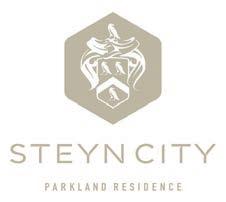
PROPERTY 25 Images: Supplied
For more information: www.steyncity.co.za Scan to go to the Steyn City website
STEYN CITY
ADVERTORIAL STEYN CITY
A luxury freehold home bordering the parkland.
Office interiors at Capital Park.
The 45km promenade is well-lit, offering security for residents.
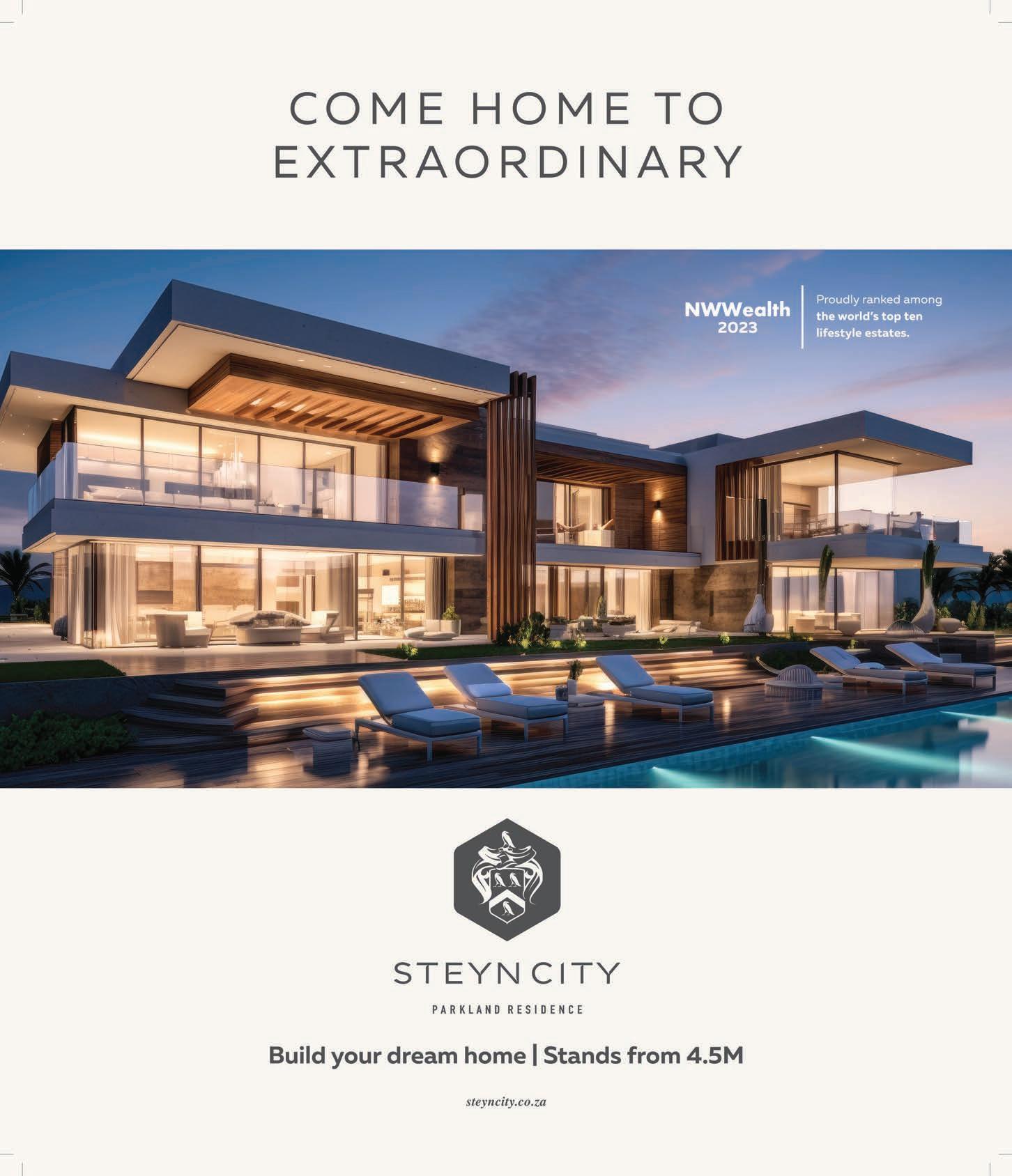
THE GROWING APPEAL OF MIXED-USE DEVELOPMENTS
The boom of mixed-use developments is now appealing to two new generations of investors. THANDO PATO nds out why

Over the past 20 years, there has been a shift in the residential landscape in metropolitan areas with the increase of mixed-use precincts. The trend is driven by several socioeconomic factors, including security, increased traffic congestion, convenience, location and, more recently, working remotely.
“Besides offering unrivalled safety and security, these developments focus on providing residents with an enhanced quality of life that meets their personal and professional needs at various life stages. Waterfall City exemplifies this modern approach to community design, incorporating a variety of residential estates catering to a range of LSM groups within a comprehensive, vibrant urban development,” says Willie Vos, CEO of Waterfall City Management Company.
CATERING TO EMPTY NESTERS AND MILLENIALS
Realtor Grahame Diedericks from Lew Geffen Sotheby’s International Realty says that mixed-use precincts are growing in popularity among empty nesters seeking smaller and lower maintenance properties. The other demographic these precincts appeal to are millennials, who are increasingly opting for an urban lifestyle that allows them greater convenience, a healthier way of life and a lock-up-and-go lifestyle,
explains Dejane Ehlers Steyl, head of marketing at Devmark Property Group.
Vos notes that this is why Waterfall City has a diverse residential estate portfolio. “We have estates that cater to empty nesters and retirees, offering a secure, active and social lifestyle with comprehensive care facilities. And then there are developments for young professionals featuring cluster houses and apartments that provide modern living spaces and amenities, including clubhouses, pools and fitness centres.”
age or life stage groups can enjoy a balanced lifestyle with reduced commute times and enhanced convenience.”
Ehlers Steyl says that some of the growing trends driving the mixed-use development sector are lifestyle amenities. “It is all about the lifestyle and facilities that these estates offer such as clubhouses, gyms, bike and running/ walking tracks, and so forth.”


QUALITY OF LIFE COUNTS
Vos explains that the growing appeal of Waterfall City, located on the N1 highway between Johannesburg and Centurion, is its proximity to the Mall of Africa and other smaller shopping centres, business centres and industrial complexes, highways and transport hubs, such as the Gautrain. “Think of it as a city within a city where everything is on your doorstep to create a completely integrated community. This delivers an unsurpassed quality of life that combines work, play and living spaces. In these lifestyle estates, residents across various
“THINK OF IT AS A CITY WITHIN A CITY WHERE EVERYTHING IS ON YOUR DOORSTEP TO CREATE A COMPLETELY INTEGRATED COMMUNITY. THIS DELIVERS AN UNSURPASSED QUALITY OF LIFE.” – WILLIE VOS
Included in Waterfall City’s residential portfolio are several estates for empty nesters including Waterfall Mature Lifestyle Estate, which houses a clubhouse featuring a restaurant, cinema, deli, bakery, beauty salon, library, billiards room, cigar lounge, business centre, formal lounges, gym, putting green, tennis courts, an arts and crafts centre and a horticulture centre. This secure lifestyle estate has 192 freestanding houses, 82 apartment suites and a 33-bed frail care centre with 24-hour medical supervision.
For younger professionals craving a waterside paradise, Waterfall City introduced the Munyaka Estate in 2023. Featuring a 30 000m2 lagoon, and over 1 000 apartments, including penthouses and villas, the estate also boasts a VIP lifestyle centre, restaurant and coffee bar, Discovery Vitality-approved gym, a spa, free Wi-Fi, a cinema room, meeting rooms, a laundromat, on-site concierge, a running track, an action sports field and a playground.
Vos explains that mixed-use developments are a sound investment for current and future investors. “These properties represent long-term, inter-generational investments offering a blend of amenities, convenience and security that cater to the needs of multiple generations. The concept behind such developments is not just to provide a place to live, but also offer a comprehensive lifestyle that evolves with its residents’ life stages.”
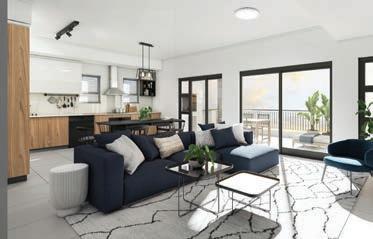
MIXED-USE DEVELOPMENT PROPERTY 27 Images: Supplied
Dejane Ehlers Steyl
Munyaka entrance
Munyaka Lifestyle lagoon side
Munyaka Gallery
BEYOND THE TRADITIONAL
Despite the rise of e-commerce, the evolution of brick-and-mortar malls keeps them relevant and growing. By
Liberty Two Degrees (L2D) chief operations officer Jonathan Sinden says shopping malls have transcended their traditional shopping function to become thriving community and lifestyle centres. “The appeal of the physical store lies in its ability to provide a holistic offering: from retail therapy, shopping for essentials, going to the cinema and enjoying a meal with family and friends at a restaurant to exercising at the gym, watching a live show, or settling a baby at a Baby Care Lounge –all without leaving the mall,” he elaborates.
TREVOR CRIGHTON
BUILDING EXPERIENCES
Sinden believes that the rise of e-commerce poses challenges for traditional mall models that do not implement innovative solutions specifically tailored to comprehend and satisfy customers’ needs. “Shopping experiences have shifted from just product sales to focusing on customer interactions and delighting shoppers while leveraging extraordinary immersive experiences,” he says.
“Brick-and-mortar retail contributes significantly to revitalising local economies and the broader
“BRICK-AND-MORTAR RETAIL CONTRIBUTES SIGNIFICANTLY TO REVITALISING LOCAL ECONOMIES AND THE BROADER FINANCIAL LANDSCAPE.” – JONATHAN SINDEN
THE HOTEL BOOM
South Africa’s hotel industry is blossoming and building on its impressive contribution to gross domestic product, writes TREVOR CRIGHTON
THE CRITICAL ROLE OF TECHNOLOGY IN 2024
The broader tourism industry, according to Alan Campbell, sales and marketing director at ANEW Hotels & Resort, contributes 7.6 per cent of South Africa’s gross domestic product (GDP), narrowly ahead of the automotive and mining industries (approximately 7.5 per cent). Despite numerous domestic challenges, it remains one of the most resilient sectors in the country’s economy.
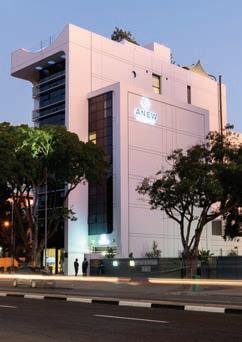
ADDING VALUE
“Tourism encompasses various investment opportunities: accommodation, dining, entertainment venues and landmarks – all of which contribute to capturing the hearts and minds of locals and international visitors,” says Campbell.
“The COVID-19 pandemic undoubtedly impacted the tourism sector globally,
but tourism has been a consistent growth area for South Africa. The growth potential is particularly evident in emerging commercial hubs such as the Limpopo province, where there is a growing demand for infrastructure development to support tourism activities.”

BON Hotels CEO Guy Stehlik says investing in hotels offers several strategic advantages for South African and international property investors, including a reliable source of income generated from multiple revenue streams and a contribution to portfolio diversification, spreading risk across different asset classes and market segments. “However, it’s essential for South African investors to carefully navigate the unique risks associated with hotel investments
financial landscape. We differentiate ourselves through delivering extraordinary customer and tenant service experiences to stay at the forefront of an evolving retail environment and investing in passionate people to drive execution.”
EMBRACING TECH
Technology plays a key role in enhancing the customer experience and smart environments are not only being leveraged to enhance consumers’ shopping experiences, but also for the benefit of retailers in the shopping mall environment. “As L2D, we have invested in ensuring our malls are smart, sustainable, agile and continue to benefit generations. Marrying the bricks and mortar and online retail offering ensures we can achieve this,” he explains.
“Smart metering systems, smart recycle and reward platforms, smart parking systems, smart digital signage, smart cameras, digital gift cards, mobile apps, self-service kiosks and free Wi-Fi are all part of this omnichannel experience.”
here. These include market cyclicality, dependence on tourism trends, operational complexities and regulatory uncertainties.”

GROWING AND GROWING
Janus Schoeman, general manager for pre-openings, transitions and projects for Newmark Hotels & Reserves, says the group’s portfolio of properties has seen exciting developments and is poised for further growth that will complement its existing offering. “Our portfolio currently consists of 25 properties, which has more than doubled in size in the last three years. This includes new additions to the portfolio in strategic areas, including the Cape Winelands, Johannesburg, Limpopo, Mauritius and Nigeria,” he says.
Campbell notes that despite the tough challenges of the COVID-19 pandemic and subsequent lockdowns, ANEW Hotels & Resorts has added 14 properties to its portfolio. BON Hotels opened six hotels during the pandemic and a further 14 since 2023.
28 PROPERTY RETAIL AND HOSPITALITY
Supplied
Images:
ANEW Hotel Green Point Cape Town (exterior)
BON Hotels Waterfront Richards Bay
Victoria & Alfred Hotel (exterior)

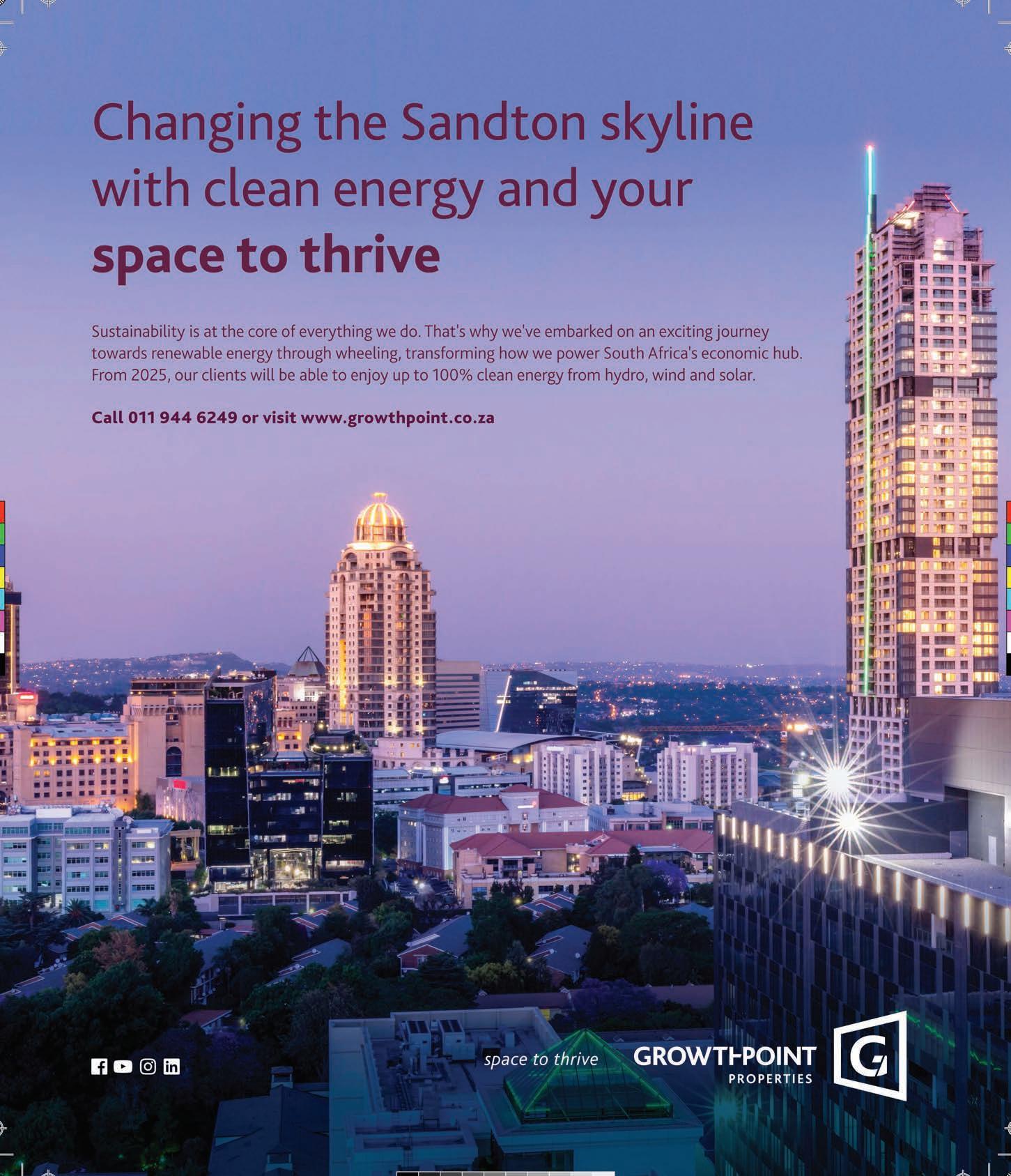

TIME FOR A CHECK-UP
Where can South African property investors expect the greatest value? BUSANI MOYO asked the estate agents
Arecent report by market intelligence and advisory company Mordor Intelligence provides a glimpse into the state of the changing residential property sector in South Africa.
The company states that with an estimated 15.6 million South Africans aged 20–34, many first-time buyers are expected to enter the market. It adds: “The purchase of freehold homes by South Africans has been steadily decreasing with buyers opting for sectional title and estate homes instead.”
What do the changing trends in South Africa’s residential sector mean for the sector’s health in general? Which types of homes are buyers opting for and where are they buying these homes?
SEMIGRATION IS REAL
That services in cities, such as Johannesburg and Tshwane, are crumbling is now apparent even to the most avid optimist. This collapse of services has led to a semigration trend, which is seeing many South Africans trek to the coastal areas, particularly in the Western Cape. “The semigration trend has flourished ever since
the pandemic,” says Adrian Goslett, regional director and CEO of RE/MAX of Southern Africa. He adds: “I predict … the semigration trend to the Western Cape and other coastal suburbs will remain strong in 2024. Sellers in these areas are likely to be able to attract higher sales prices than sellers situated in the inland regions.”
Renier Kriek, the managing director of Sentinel Homes, shares the same insights as Goslett. He notes that “service delivery has crumbled in the inland provinces”. Kriek suggests that this situation “has led to property booms in areas such as the Garden Route, specifically Mossel Bay, Knysna and Plettenberg Bay, and the West Coast, for example, Langebaan, Vredenburg, Paternoster and St Helena Bay”.
Goslett and Kriek’s sentiments indicate that even though the health of inland properties may not be as robust, coastal cities in the Western Cape receive a clean bill of health.
SHIFTING PREFERENCES, SHIFTING VALUE
Load shedding, dissatisfaction with service delivery and safety concerns in South Africa, in general, have also profoundly affected home
buyers’ preferences. For example, Renico Construction, the company that targets first-time home buyers and property investors, reports that “today’s first-time buyers are sacrificing personal space in favour of community”.
Samuel Seeff, chairman of the Seeff Property Group, says: “Young professionals and families enjoy being within walking distance of amenities, which means they can enjoy more leisure time and spend less time travelling.” He adds: “Lifestyle estates are increasingly including private schools or access to schools – a big benefit for luxury buyers. They also offer leisure space to run, walk and cycle, and often extras, such as a clubhouse and gym, among others.”
In October 2023, Investec, an Anglo-South African international banking and wealth management group, hosted a property market seminar. One of the speakers was lead data scientist at Lightstone Prenil Sewmohan. His analysis provides a glimpse of where the value in South Africa’s property sector lies. He noted: “Out of seven million residential properties (worth R6.6-trillion), freehold (over 80 per cent of properties) dominated in, but represented 65 per cent of the total value. Sectional title homes formed 12 per cent of the number, but about 15 per cent of the value, while estates made up 7 per cent of the total number of homes, but represented 20 per cent of the value.”
GREAT POTENTIAL, BUT …
Most analysts agree that the South African residential property market has great potential. Still, government must get the fundamentals right, end load shedding and get municipalities working. For instance, Kriek concludes: “Nationally, the demand for investment properties is at a fifteen-year high. Normally, investment properties form about 4 per cent of home loan applications. This is currently at 11.8 per cent, a nearly threefold increase.”

RESIDENTIAL PROPERTY PROPERTY 31 Images: PeopleImages/istockphoto.com
REA D MORE
REPORT
THE MORDOR INTELLIGENCE
LOAD SHEDDING, DISSATISFACTION WITH SERVICE DELIVERY AND SAFETY CONCERNS IN SOUTH AFRICA, IN GENERAL, HAVE ALSO PROFOUNDLY AFFECTED HOME BUYERS’ PREFERENCES.
BUYING PROPERTY OVERSEAS: WHERE ARE SOUTH AFRICANS INVESTING?
BUSANI MOYO discovers why many South African property investors are ocking to the United Kingdom and Dubai
The challenges facing South Africa are well-documented: a struggling economy, rising levels of corruption, rampant crime, a weakening currency and a high unemployment rate. It is therefore not surprising that many South Africans investing in property are looking outside the country for stability and better returns. The United Kingdom (UK) and Dubai are two popular destinations for these investors. But why are they finding these destinations lucrative?
Yael Geffen, chief executive officer at Lew Geffen Sotheby’s International Realty, has the answer: “Both Dubai and the UK offer stable and robust economies with favourable growth prospects.” She adds: “Dubai’s strategic location as a global business hub and its diversified economy driven by sectors, such as tourism, real estate, finance and logistics, attract investors looking for dynamic opportunities.” Regarding the UK, she agrees with other real estate professionals who say the country is favoured for an established economy, strong financial services sector, good government and access to European markets.
THE UK: STABILITY, SHARED HISTORY AND LANGUAGE
Sophie Gamborg, head of LIO International Property, has been helping overseas investors purchase property in the UK for over a decade. She agrees with Geffen and notes that South African property investors in the UK mostly seek stability.
“South Africans know that the UK is a safe and stable place to put some capital, and that it’s in a hard currency asset that’s tangible,” she says. The preference to buy property in the UK is happening within an environment where the UK Sterling has gained around 30 per cent against the South African Rand within the last decade. This reality means that an investor who

has put their money in the UK property market in the past ten years has already made a return based on the strengthening pound alone.
Gamborg adds that South Africans generally gravitate towards the United Kingdom when they want to buy property because the UK and South Africa share a history and language.
The cultural and economic connections between the UK lead to more South Africans sending their children to UK educational institutions. Thus, for those who can afford it, it makes sense to invest in UK property.
“SOUTH AFRICANS INVESTING IN THE DUBAI MARKET CAN EXPECT STEADY RENTAL YIELDS OF BETWEEN FOUR AND EIGHT PER CENT THANKS TO HIGH OCCUPANCY RATES DUE TO LIMITED RENTAL STOCK.” – NOMBASA MAWELE
THE HIDDEN BENEFITS OF INVESTING IN UK PROPERTY
REA D MORE


DUBAI: LUCRATIVE FINANCIAL INCENTIVES
Nombasa Mawele knows the Dubai market like the back of her hand. She is the licensee holder of the property group Seeff Dubai. Asked why South African property investors seem to fl ock in the direction of the Dubai market, she replies: “Unlike other markets, Dubai has lucrative payment plans for all off-plan developments. A South African investor can even pay as little as one per cent post their down payment up to the completion and handing over of their property.” Mawele explains that these plans are structured in a way that accommodates proper fi nancial planning by buyers, affording them enough breathers between their instalments.
Apart from the lucrative payment plans, Mawele notes that South Africans investing in the Dubai market can expect steady rental yields of between four and eight per cent thanks to high occupancy rates due to limited rental stock.
According to the Seeff Property Group: “The Dubai rental market comprises a mix of short-term rentals with people visiting the city in their millions.” The company adds: “Dubai Tourism statistics show that some 15.37 million people visited between January and November 2023.”
32 PROPERTY RESIDENTIAL PROPERTY
Images: Supplied
Nombasa Mawele


Investing in integrated medical solutions
Considering the prevailing belief that the demand for residential healthcare developments is unlikely to diminish in the aftermath of the events of 2020, various medical service trends have since gained signi cant popularity in the last couple of years, writes ITUMELENG MOGAKI

The trends within medical development projects range from virtual healthcare, proactive healthcare approaches and preventative care to frail care centres in and around residential areas.
According to Louise Martin, CEO of Estate Living, developers tend to invest in a retirement estate with an ageing-in-place offering and medical support or a hospital nearby.
Martin says that full-blown medical centres and frail care facilities are not increasing; rather than investing in stand-alone frail care facilities, developers are focusing on offering support services within retirement estates.
“I think there is huge value in building retirement communities, and these are really doing well, but hospitals and frail care centres tend to work better outside of a retirement village. They tend to be built nearby and offer a shared service to a wider community, for example, the one in Century City in Cape Town. This is the same with developers, such
as Faircape and Evergreen, that tend to build retirement estates that may have a step-down facility, but not necessarily a full-blown frail care solution,” says Martin. She envisions that investing in communities providing integrated medical solutions has a bright future.
“The emergence of lifestyle estates with on-site medical suites reflects a broader trend towards holistic care. As already alluded, developers are drawn to areas with a high concentration of retirees, where the prospect of new hospitals stimulates residential development,” she explains.
A HOSPITAL CLOSE BY DRIVES EXPANSION
Martin cites Hermanus in Cape Town as a prime example where the anticipation of a new hospital drives the expansion of retirement communities.
“What we are seeing is that in a naturally recurring retirement area, such as Hermanus, where you have many people of a certain age, more hospitals are being built. This brings in
“DEVELOPERS ARE DRAWN TO AREAS WITH A HIGH CONCENTRATION OF RETIREES, WHERE THE PROSPECT OF NEW HOSPITALS STIMULATES RESIDENTIAL DEVELOPMENT.” – LOUISE MARTIN
more residential development. As soon as there is a promise of a hospital going up in an area, you tend to see many ageing or retirement communities being built around it.”
She adds: “One should remember that within the medical side of retirement and ageing, we are finding that there is an increasing number of people being diagnosed with mental health issues, and these individuals require a different kind of service to someone who has physical medical issues.”
MUCH-NEEDED SOWETO CLINIC UNDER CONSTRUCTION
Despite Martin’s strong views on the supposed declining prevalence of full-scale medical centres, new medical property developments are being constructed. The Naledi Clinic in Ext. 2, Soweto, is one such development.
A Johannesburg Development Agency (JDA) project, on behalf of the City of Johannesburg, the construction of the much-anticipated Naledi Clinic facility is advancing rapidly, promising a transformative impact on healthcare accessibility and quality for the Naledi community.
The Naledi Clinic facility consists of four separate wings – the chronic wing, the antenatal wing, the acute wing and the emergency wing. With 18 consultation rooms, including support buildings, the Naledi Clinic will be close to the existing temporary clinic in Naledi Ext. 2.
“The facility will accommodate larger volumes of patients and provide a wider range of services. The consulting rooms, at minimum 15m2 each, will be divided between the main streams, namely chronic, antenatal and acute, as well as an emergency wing with an ambulance pick-up,” says JDA CEO Siyabonga Genu.
Genu adds: “The single-storey design reflects a dedication to inclusivity and accessibility, making healthcare services easily navigable for all. The construction process is monitored closely to ensure its completion within budget.”
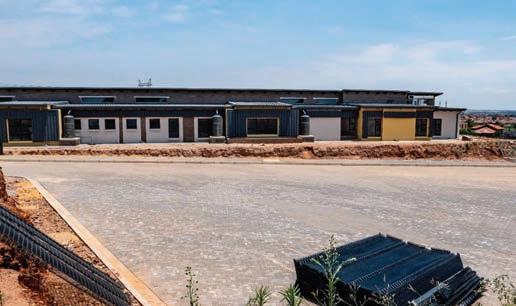
MEDICAL DEVELOPMENTS PROPERTY 35 Images: Supplied
The Naledi Clinic facility consists of four separate wings.
The much-anticipated Naledi Clinic facility is under construction.
NEW INVESTMENT OPPORTUNITIES IN STUDENT ACCOMMODATION
South Africa’s tertiary institutions are experiencing a steady increase in student enrolments and, with traditional campus accommodation unable to cater for the growing demand, private developers have seized the opportunity. THANDO PATO speaks to several developers about the investment potential of student housing

The Department of Higher Education and Training released, in 2020, a report revealing a shortage of over 400 000 beds for students at public tertiary institutions. The growing demand for student accommodation has resulted in several developers across South Africa introducing upmarket student accommodation complexes in the vicinity of tertiary institutions in major metropolitan areas.
Leon Howell, managing director of CampusKey, which has properties in Cape Town, Stellenbosch, Gqeberha, Potchefstroom, Bloemfontein and Pretoria, says the behavioural trends of Gen Z have helped shape the private student accommodation industry. “The industry is focused on community-centred living spaces that offer diverse unity types and varied spaces for entertainment and study. However, purpose-built student accommodation is not just about providing comfortable living spaces – it’s about creating a platform that offers an exceptional living experience,” he explains.
Howell adds that the various CampusKey buildings serve as student hubs for fostering a sense of community among students. “We offer contemporary social spaces that feature food and drink experiences, breakaway lounges, co-working spaces for group projects or quiet study pockets, state-of-the-art gyms, gaming zones, electric scooter rentals, parking facilities, laundry areas and 24/7 reception services.”
PROXIMITY TO EDUCATIONAL INSTITUTIONS A KEY FACTOR
Growthpoint Student Accommodation REIT is another player in the market with 13 properties – which operate as all-inclusive estates with laundry, gym, parking, communal and private study areas and Wi-Fi facilities – across Cape Town, Pretoria, and Johannesburg. Amogelang Mocumi, fund manager of Growthpoint Student Accommodation REIT, says comfortable and modern buildings and furnishings are what set the new housing complexes apart, but Growthpoint is also focused on convenience and accessibility. “Our purpose-built student accommodation is located and designed around students to help them succeed and make the most of their university experience,” he explains.
“Each building added to our portfolio is unique in its architecture and design to reflect and foster its specific community. Also, all our properties are within a 10-minute walk of major university campuses. For instance, our new student accommodation at 33 Princess of Wales Street in Parktown will introduce 500 new beds for the 2025 academic year, and it is just two minutes from Wits Health Sciences Campus.”
OPPORTUNITY AND SOME CHALLENGES
One of the key features of both CampusKey and Growthpoints’ Student Accommodation
“PURPOSE-BUILT STUDENT ACCOMMODATION IS NOT JUST ABOUT PROVIDING COMFORTABLE LIVING SPACES – IT’S ABOUT CREATING A PLATFORM THAT OFFERS AN EXCEPTIONAL LIVING EXPERIENCE.” – LEON HOWELL

REIT are the short-and long-term rental options, which provide flexibility, especially for mature students doing senior degrees who may have alternative requirements.
Howell says investors in the student accommodation market can expect a steady supply of tenants annually due to the high demand for all-inclusive, high-quality accommodation. “They also have the opportunity to set rental rates annually and, with proper management, can expect acceptable returns on their investment.”
Mocumi, however, is cautious, citing various challenges in the higher education sector that impact student accommodation. “We see significant potential for investing in and developing more purpose-built student accommodation in South Africa. However, the extent to which the potential is realised is dependent on investors’ confidence in the sector. Unfortunately, the current negativity around NSFAS does little to inspire investor confidence, resulting in investors adopting a wait-and-see attitude.
“There is an increasing demand for student accommodation, driven by higher enrolment due to more and better financing options for economically disadvantaged students. The introduction of the NSFAS loan scheme for the ‘missing middle’ will further boost access to education funding, leading to more demand for quality student accommodation. With universities focusing their resources on teaching facilities to meet this enrolment increase, the provision of new accommodation is left to the private sector,” Mocumi concludes.”
36 PROPERTY STUDENT ACCOMMODATION
Images: Supplied
 Cape Town | Potchefstroom | Gqeberha | Bloemfontein
Cape Town | Potchefstroom | Gqeberha | Bloemfontein
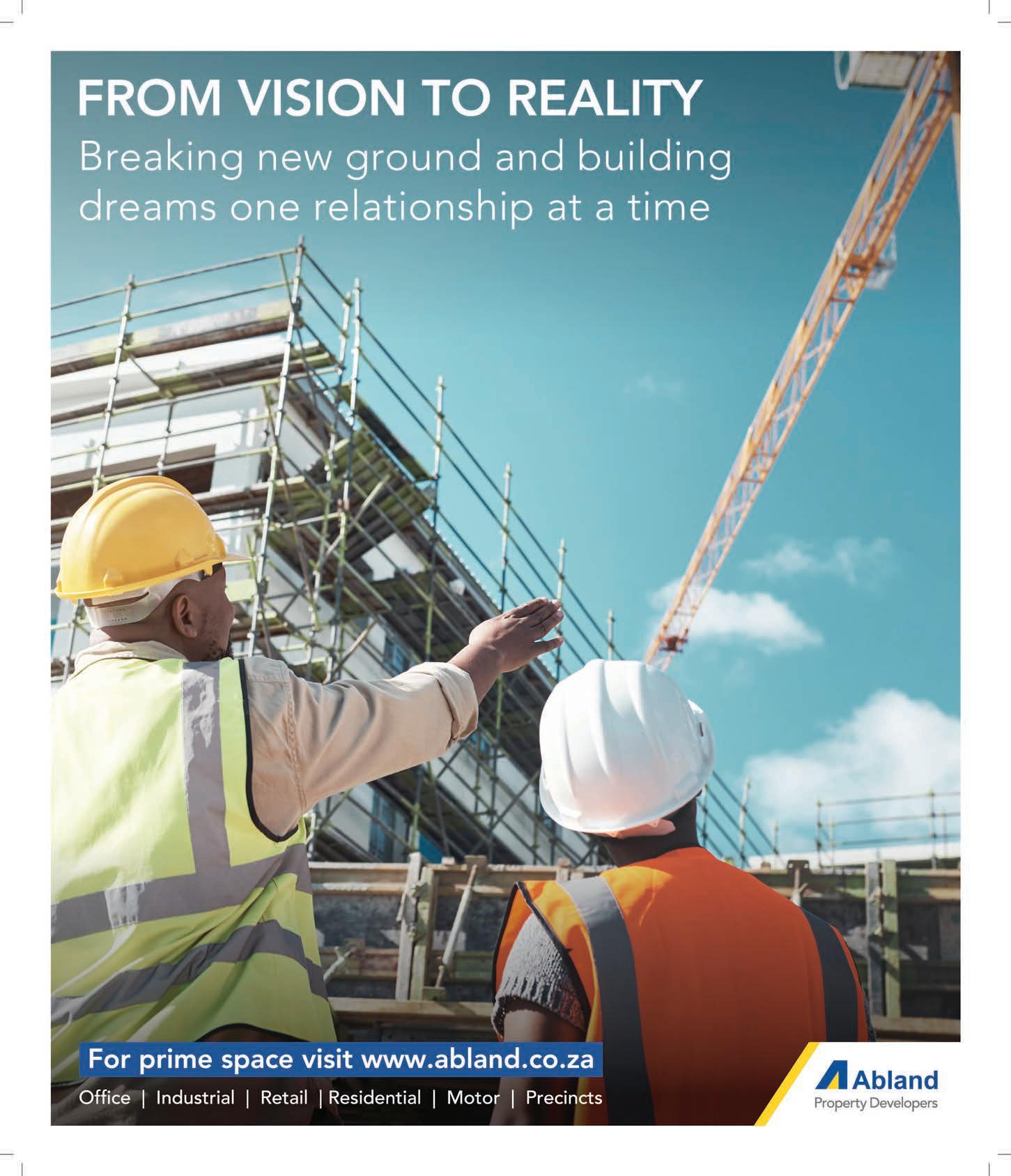
































































































































































 Cape Town | Potchefstroom | Gqeberha | Bloemfontein
Cape Town | Potchefstroom | Gqeberha | Bloemfontein
